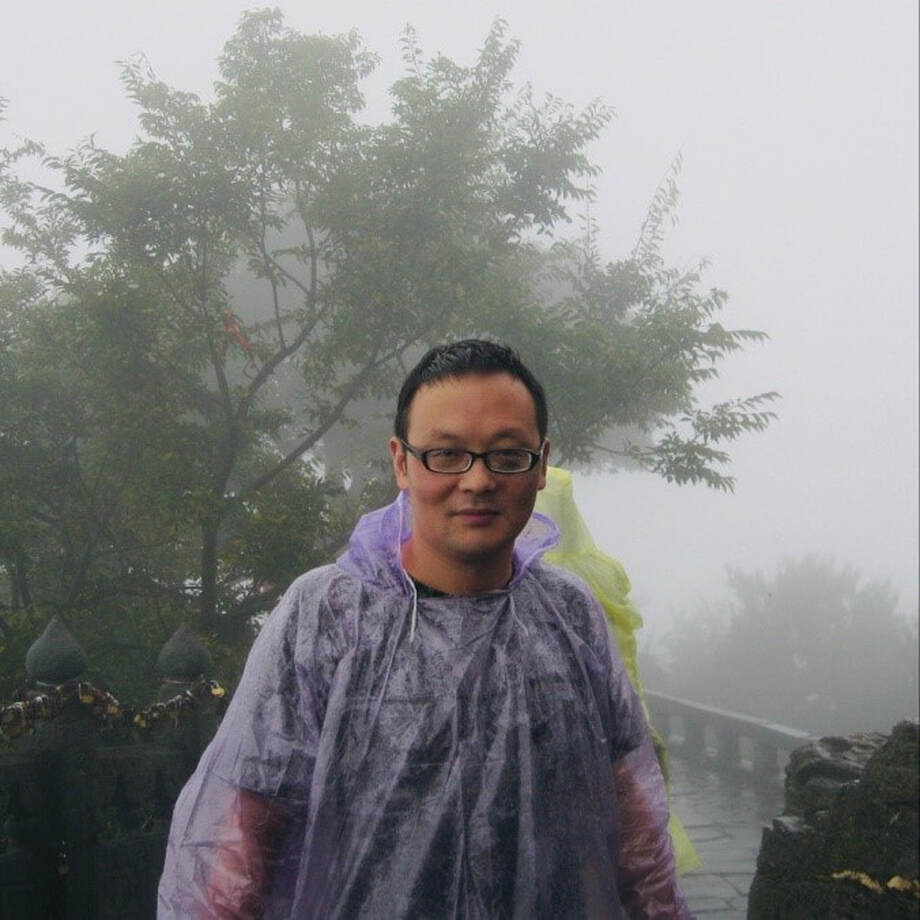- Home
- Process Worldview
- Community
- Art and Music
- Whitehead and Process Thinking
- Podcasts
- Spirituality
- Ecological Civilization
- Education
- Contact
- Social Justice
- Science
- Animals
- Sacred Poems
- Whitehead Videos
- Index of All Titles
- Practicing Process Thought
- Process Spirituality: A Spiritual Alphabet
- Recent Posts
Seven Process Poets in China
Process philosophy is a bridge-building tradition. It aims to forge connections between the East and West, North and South, as well as between science and religion, and between progressives and traditionalists. It also seeks to build bridges between humanity and the more-than-human world: hills and rivers, trees and stars. It sees humanity within, and part of, a living Earth. Process philosophy is an eco-bridge tradition.
One place where this bridge-building is especially important is in international relations, particularly between China and the United States. This is especially true given the hostility often directed towards China by American politicians. Too frequently, these politicians overlook the human element, forgetting that China is a nation of individuals—both young and old—rather than just a government entity.
One way that process philosophy can contribute to this bridge-building is through the promotion of cross-cultural communication and sharing. One area where such sharing can prove fruitful is in the realm of process poetry. This page introduces Americans and others to the Chinese tradition of process poetry by featuring the works of six Chinese poets. The poems are presented in their original Chinese script, without translation. This is partly because translation can distort the meaning of the poems, but also because Chinese script is an art form in its own right—worthy of respect and even amazement for its visual beauty.
My hope is that, through this page, an appreciation for the poetry—and indeed for the broader cultural landscape—emerges not just intellectually but also aesthetically. Americans cannot befriend Chinese until and unless they recognize the independent integrity and beauty of Chinese language, independent of its being reduced to English.
- Jay McDaniel
One place where this bridge-building is especially important is in international relations, particularly between China and the United States. This is especially true given the hostility often directed towards China by American politicians. Too frequently, these politicians overlook the human element, forgetting that China is a nation of individuals—both young and old—rather than just a government entity.
One way that process philosophy can contribute to this bridge-building is through the promotion of cross-cultural communication and sharing. One area where such sharing can prove fruitful is in the realm of process poetry. This page introduces Americans and others to the Chinese tradition of process poetry by featuring the works of six Chinese poets. The poems are presented in their original Chinese script, without translation. This is partly because translation can distort the meaning of the poems, but also because Chinese script is an art form in its own right—worthy of respect and even amazement for its visual beauty.
My hope is that, through this page, an appreciation for the poetry—and indeed for the broader cultural landscape—emerges not just intellectually but also aesthetically. Americans cannot befriend Chinese until and unless they recognize the independent integrity and beauty of Chinese language, independent of its being reduced to English.
- Jay McDaniel
Process Poetry Education
Introduction
Recently, I had the pleasure of reading "Outline of Process Poetry Education Practice" by two Chinese educators, artists, and philosophers: Zhang Yuanyuan and Bai Ya. Zhang Yuanyuan is renowned for her work in animal protection, empathy education, and a novel form of education known as Caring for Life Education. Bai Ya is recognized for his contributions to and leadership in the Process Poetry movement. Its tagline is "eyes of process, heart of ecology, pen of freedom, indicating a threefold emphasis on process philosophy, ecological spirituality, and the writing of poetry, understood as free self-expression.
Their collaborative work combines their efforts to present a vision of a constructive fusion of these two movements, which collectively bring about a significant cultural transition in China and around the world. In the following paragraphs, I will summarize their concepts for a Western, American audience.
The Caring for Life Education Movement
Gaining momentum in mainland China, the Caring for Life Education Movement nurtures compassion, reverence for all living beings, and environmental awareness. It fosters a mindset that acknowledges the interconnectedness of human well-being, animal welfare, and ecological health. By promoting values such as empathy, integrity, wisdom, and the flourishing of all life forms, this movement empowers individuals to make mindful decisions that contribute to harmonious coexistence. Rooted in principles of lifelong learning encompassing intellectual, emotional, moral, and spiritual growth, it advocates for decision-making strategies prioritizing empathy and responsible environmental stewardship.
The Process Poetry Movement
Celebrating the integration of traditional Chinese cultural heritage with the philosophy of process, the Process Poetry Movement flourishes among young poets in mainland China. It embraces the fusion of Chinese and Western cultural elements, emphasizing ecological awareness, the essence of regional poetry, and the guiding principles of process-oriented perception, ecological mindfulness, and creative liberation. In a narrower sense, it reflects heightened self-awareness within the context of an ecological civilization. On a broader scale, it synthesizes Eastern and Western influences to empower individuals in navigating contemporary life.
Combining the Movements
Uniting the Caring for Life Education and Process Poetry Movements in mainland China fosters holistic well-being and ethical consciousness. The principles of the Caring for Life Education Movement align seamlessly with the core values upheld in the Process Poetry Movement. As empathy, interconnectedness, and environmental responsibility are emphasized by the former, they harmonize with the themes championed by the latter.
An Innovative Holistic Educational Approach: Process Poetry Education
This combined effort shapes an innovative educational approach known as Process Poetry Education, emphasizing both poetic and analytical thinking. It unites insights from the humanities and sciences into a cohesive way of being. Embracing the Confucian tradition, it recognizes that education extends beyond the classroom. This synthesis presents an image of holistic education, fostering compassionate and sustainable individuals with a profound understanding of human and natural dimensions.
Living Poetically: A New Way of Being
Process Poetry is not solely about crafting verses; it's about living with compassion, creativity, and sincerity. While writing poetry is one form of self-expression, countless others, like music-making, gardening, and volunteering, also enrich this way of living. This authentic way of life contributes to a new spirit emerging in China and beyond. Collaboration with kindred spirits aims to positively impact society through collective efforts.
Community in a Changing Landscape: Embracing Both Physical and Virtual
In our evolving era, the concept of "community" takes on new dimensions—both local and virtual. Living poetically transcends these boundaries, fostering connections in both physical neighborhoods and digital networks. This holistic perspective emphasizes the interconnectedness of human experiences, bridging evolving community dynamics and creating a harmonious and compassionate global society.
Toward an Ecological Civilization: A Vision of Compassion and Creativity
Participants in the Caring for Life Education and Process Poetry Movements aspire to cultivate an ecological civilization centered on compassion and creativity. This civilization redefines success, emphasizing interconnectedness, sustainability, and respect. Rural and urban communities thrive as hubs of creativity, compassion, and inclusivity, caring for the Earth and all beings. This aspirational ideal invites everyone, regardless of identity, to engage in a poetic way of living.
Freedom, Play, and Wise Decisions: Enriching the Poetic Way of Life
Freedom and play enrich the poetic way of life, complementing verses with wise decisions. The Process Poetry Education movement acknowledges that true liberation lies not only in self-expression but also in authentic engagement with the world. A spirit of playfulness fosters spontaneity and creativity, paired with the wisdom to navigate life's complexities.
Acknowledging New Forms of Community in an Evolving Era
Modern society witnesses new forms of community—both geographical and virtual. Living poetically bridges these worlds, offering connections and shared experiences. By embracing diverse community dimensions, participants contribute to inclusive, compassionate, and interconnected societies that honor the value of all life.
Pioneering an Ecological Civilization: A Vision of Compassion and Creativity
This aspiration extends beyond personal growth, striving to pioneer an ecological civilization founded on compassion and creativity. This redefined civilization flourishes in harmony with the Earth, transcending cultural boundaries. It invites all to live poetically, weaving a narrative of hope, unity, and transformative potential, impacting not only mainland China but the entire world.
- Jay McDaniel
Recently, I had the pleasure of reading "Outline of Process Poetry Education Practice" by two Chinese educators, artists, and philosophers: Zhang Yuanyuan and Bai Ya. Zhang Yuanyuan is renowned for her work in animal protection, empathy education, and a novel form of education known as Caring for Life Education. Bai Ya is recognized for his contributions to and leadership in the Process Poetry movement. Its tagline is "eyes of process, heart of ecology, pen of freedom, indicating a threefold emphasis on process philosophy, ecological spirituality, and the writing of poetry, understood as free self-expression.
Their collaborative work combines their efforts to present a vision of a constructive fusion of these two movements, which collectively bring about a significant cultural transition in China and around the world. In the following paragraphs, I will summarize their concepts for a Western, American audience.
The Caring for Life Education Movement
Gaining momentum in mainland China, the Caring for Life Education Movement nurtures compassion, reverence for all living beings, and environmental awareness. It fosters a mindset that acknowledges the interconnectedness of human well-being, animal welfare, and ecological health. By promoting values such as empathy, integrity, wisdom, and the flourishing of all life forms, this movement empowers individuals to make mindful decisions that contribute to harmonious coexistence. Rooted in principles of lifelong learning encompassing intellectual, emotional, moral, and spiritual growth, it advocates for decision-making strategies prioritizing empathy and responsible environmental stewardship.
The Process Poetry Movement
Celebrating the integration of traditional Chinese cultural heritage with the philosophy of process, the Process Poetry Movement flourishes among young poets in mainland China. It embraces the fusion of Chinese and Western cultural elements, emphasizing ecological awareness, the essence of regional poetry, and the guiding principles of process-oriented perception, ecological mindfulness, and creative liberation. In a narrower sense, it reflects heightened self-awareness within the context of an ecological civilization. On a broader scale, it synthesizes Eastern and Western influences to empower individuals in navigating contemporary life.
Combining the Movements
Uniting the Caring for Life Education and Process Poetry Movements in mainland China fosters holistic well-being and ethical consciousness. The principles of the Caring for Life Education Movement align seamlessly with the core values upheld in the Process Poetry Movement. As empathy, interconnectedness, and environmental responsibility are emphasized by the former, they harmonize with the themes championed by the latter.
An Innovative Holistic Educational Approach: Process Poetry Education
This combined effort shapes an innovative educational approach known as Process Poetry Education, emphasizing both poetic and analytical thinking. It unites insights from the humanities and sciences into a cohesive way of being. Embracing the Confucian tradition, it recognizes that education extends beyond the classroom. This synthesis presents an image of holistic education, fostering compassionate and sustainable individuals with a profound understanding of human and natural dimensions.
Living Poetically: A New Way of Being
Process Poetry is not solely about crafting verses; it's about living with compassion, creativity, and sincerity. While writing poetry is one form of self-expression, countless others, like music-making, gardening, and volunteering, also enrich this way of living. This authentic way of life contributes to a new spirit emerging in China and beyond. Collaboration with kindred spirits aims to positively impact society through collective efforts.
Community in a Changing Landscape: Embracing Both Physical and Virtual
In our evolving era, the concept of "community" takes on new dimensions—both local and virtual. Living poetically transcends these boundaries, fostering connections in both physical neighborhoods and digital networks. This holistic perspective emphasizes the interconnectedness of human experiences, bridging evolving community dynamics and creating a harmonious and compassionate global society.
Toward an Ecological Civilization: A Vision of Compassion and Creativity
Participants in the Caring for Life Education and Process Poetry Movements aspire to cultivate an ecological civilization centered on compassion and creativity. This civilization redefines success, emphasizing interconnectedness, sustainability, and respect. Rural and urban communities thrive as hubs of creativity, compassion, and inclusivity, caring for the Earth and all beings. This aspirational ideal invites everyone, regardless of identity, to engage in a poetic way of living.
Freedom, Play, and Wise Decisions: Enriching the Poetic Way of Life
Freedom and play enrich the poetic way of life, complementing verses with wise decisions. The Process Poetry Education movement acknowledges that true liberation lies not only in self-expression but also in authentic engagement with the world. A spirit of playfulness fosters spontaneity and creativity, paired with the wisdom to navigate life's complexities.
Acknowledging New Forms of Community in an Evolving Era
Modern society witnesses new forms of community—both geographical and virtual. Living poetically bridges these worlds, offering connections and shared experiences. By embracing diverse community dimensions, participants contribute to inclusive, compassionate, and interconnected societies that honor the value of all life.
Pioneering an Ecological Civilization: A Vision of Compassion and Creativity
This aspiration extends beyond personal growth, striving to pioneer an ecological civilization founded on compassion and creativity. This redefined civilization flourishes in harmony with the Earth, transcending cultural boundaries. It invites all to live poetically, weaving a narrative of hope, unity, and transformative potential, impacting not only mainland China but the entire world.
- Jay McDaniel
Seven Process Poets
poetry, ecology, creativity
过程诗学代表诗人:六人诗选(30首)
︱巫小茶、榛莽、张口、庄梦媛、马映、茧衣︱
【巫小茶5首】
巫小茶(Wu Xiaocha),过程诗学(Process Poetry)代表诗人。1981年生于福建莆田。曾在广州从业网游、杂志编辑等工作。早期诗作多以童话原型入诗,有评论称她为“童话诗人”。2017年参与写作《过程诗学对话录》。2021年参加美国中美后现代发展研究院主办的过程诗学国际论坛,并发表演讲《长洲岛历险记》。著有诗集《我一直坐在我的身旁》。
《马路上扑塑料袋的男人》
一阵大风吹来
抬头,我看见一个男人
扑向空中的一个大塑料袋
又一阵风吹来
塑料袋跳舞似的又飞了
他扑个空
这回塑料袋轻轻落回地面
他面有惊喜之色
再次往前一个猛扑
摔在了马路上
塑料袋却依然轻盈地舞着
在不远处安静地落下。
2003-4-2
《雪落在我的身上》
多年之后,你突然来访
在我的心头散步
放羊,生出那么多藤蔓和花朵
只为封住秘密的果实
在我身上
凿一口生活的井
击败我
使我的心跳
成为故事的开端
我们在尚未共进的晚餐中
点了一份无法兑现的承诺
藤纹的椅背上
一条羊毛围巾滑落下来
柔软得像谎言
包裹着
三年寒疫
和十二月的狂欢
在人间,落日的呼唤
就像我呼唤你
用尽了各种语言
却开不出真诚的花朵
只是在一个人的午餐中拿起刀叉
将面前的羊排切成小块
优雅地送进嘴里
告别时
雪穿过屋顶
飘落在我的身上
2023-1-4,莆田
《植物》
此时,植物在我的眼睛里疯长
它们自彼此的体内出发、穿越国境
蔓延,却从未纠缠。
做自己的王:谈笑即生灭
即人间烟火与天上星河
即一部用手摸起来空荡荡的宇宙史
它们知己知彼,花开有时
彼时—--
我潜入我的体内盗取梦境的火种
植物疯长,点燃它们自己
为我做两世的花火:
一世墓床,一世摇篮
2020-2-22
《女儿》
那天我没给梦上锁,冰封的大海、古墓巫师、
衣橱里的魔鬼、银杏树精灵和
猫眼石之光
从我的眼睛里掉了出来
钻进女儿的耳朵
它们就真的在这个世上安家了。今天
女儿很严肃地说起这件事,而我从不知道它们跟她
一起去过海里潜水,看过大群的鱼在脚边游
把千奇百怪的白天搬到梦里
扑灭我头发上偶然的
失火。夜晚被拆成一片片写着不同故事的叶子
挂在窗口,请风对我耳语
听说她将会有两个女儿,一个是她自己的
一个是我。她长大了我就变小了
她以为自己终于可以打败妈妈被魔鬼抓去洗碗的那个夜晚
2022-4-4
《鬼压床》
童年是玉兰树上
自在的星野
树下的狗
撒欢时
小小的我
正在板凳上读诗
独自一人
对抗每日的鬼压床
等我把星星固定在星盘上
狗离开了尘世
玉兰树死
玉兰花
压在唐诗三百首的某一页
我在诗里
怎么也起不了身
2023-5-19,莆田
榛莽(Zhen Mang),过程诗学(Process Poetry)代表诗人。资深茶人。本名秦振林,1987年生于山东滕州,现居天津。2018年参与写作《过程诗学对话录》。2021年参加美国中美后现代发展研究院主办的过程诗学国际论坛,发表演讲《真诚是微妙的自然心法》。著有长诗《晚安,四壁》等。
《散步》
饭后散步,脚下有些恍惚。
夜色从竹林中升起,
那贴着水面飞来的,是野鸭子
断断续续的叫声,不是野鸭子。
一想到冬天到了,而我的身边没有下雪,
就感觉春天不会来了。
山中日月长,眉间愁苦短。
这条善忘的山路铺满碎石子。
溪水挂在耳边,反复提醒着什么,
又好像什么也不愿说。
这座小山村什么也不多,什么
也不少。一草一木,
秩序井然。今晚,我走满一千步
就转身回去。把溪水还给深山,
把深山,还给时间。今晚,
我们相安无事,互不相欠。
2015年12月,福鼎梅山
《日常生活》
渡轮上,那个悲伤的男人
不是我。
我坐在他旁边,看见落日
就要掉进海里了,
海鸥无力地扑救,仿佛是
整片水域都要燃烧起来。
马达的轰鸣里,牛马嘶鸣,
荒草随风卷动。
在北方,我见过无数张悲伤的脸
被西风雕刻得鲜明起来,
并因此而摒弃了四季的概念。
2013年,厦门
《残阳为何如血》
残阳为何如血,这个问题
我在童年就已知道答案
傍晚的天空,与蝙蝠一起飞的
不光是云彩,还有
纸马、纸车、纸电视燃烧的
火苗和灰烬
伴着带血的哭声
那几年,我所熟悉的老人
相继去世,哥哥说:
天宫缺了佣人
我向西边望了望,想着他们
原来还要放羊、拾柴、割草
血染的云彩就贴了过来
再也没有离开
2008年,聊城
《无题》
终归要走。路在那里,村子在那里,
而坟丘不知起于何处。
碑石站立,漷河已不是覆郭之害。
溺亡者在水底欣赏月光,
火焚者于灰里食肉,而我被一根鱼刺卡在喉间
常在夜里疼得拍着桌子大笑,大口喝风,大口吃酒。
我常在夜里爬到城楼上,脚蹬高跷,与明月对骂。
我说方言,也用普通话。而城下的士子说:
“城楼塌陷久矣。”
与士子言,最怕“家书”二字。我们村没有会写字的人。
而我的梦境却被它割得像是得了破伤风。
2010年,聊城
《余生》
迷蒙中,伸手将蚊子打成重伤。
这劫后余生的清晨,
我像火山一样从时间的深渊里醒来,
七窍生烟地看着那只蚊子
正悲壮激昂地留着我的血。
它的颤抖让冬季暴露了行踪。
我出神地看着,仿佛做下了这一切的
另有其人。
他一直躲在暗处看着我。
我睡觉时,在僻静的墙角撒尿时,
对迎面而来的美女装作视而不见时……
他一直躲在暗处,他的视角
与上帝平行。但他并非上帝。
此刻他宁静。他的宁静告诉我:
所有狂暴都有一个宁静的开始。
2013年,漳州
【张口5首】
榛莽(Zhen Mang),过程诗学(Process Poetry)代表诗人。资深茶人。本名秦振林,1987年生于山东滕州,现居天津。2018年参与写作《过程诗学对话录》。2021年参加美国中美后现代发展研究院主办的过程诗学国际论坛,发表演讲《真诚是微妙的自然心法》。著有长诗《晚安,四壁》等。
《散步》
饭后散步,脚下有些恍惚。
夜色从竹林中升起,
那贴着水面飞来的,是野鸭子
断断续续的叫声,不是野鸭子。
一想到冬天到了,而我的身边没有下雪,
就感觉春天不会来了。
山中日月长,眉间愁苦短。
这条善忘的山路铺满碎石子。
溪水挂在耳边,反复提醒着什么,
又好像什么也不愿说。
这座小山村什么也不多,什么
也不少。一草一木,
秩序井然。今晚,我走满一千步
就转身回去。把溪水还给深山,
把深山,还给时间。今晚,
我们相安无事,互不相欠。
2015年12月,福鼎梅山
《日常生活》
渡轮上,那个悲伤的男人
不是我。
我坐在他旁边,看见落日
就要掉进海里了,
海鸥无力地扑救,仿佛是
整片水域都要燃烧起来。
马达的轰鸣里,牛马嘶鸣,
荒草随风卷动。
在北方,我见过无数张悲伤的脸
被西风雕刻得鲜明起来,
并因此而摒弃了四季的概念。
2013年,厦门
《残阳为何如血》
残阳为何如血,这个问题
我在童年就已知道答案
傍晚的天空,与蝙蝠一起飞的
不光是云彩,还有
纸马、纸车、纸电视燃烧的
火苗和灰烬
伴着带血的哭声
那几年,我所熟悉的老人
相继去世,哥哥说:
天宫缺了佣人
我向西边望了望,想着他们
原来还要放羊、拾柴、割草
血染的云彩就贴了过来
再也没有离开
2008年,聊城
《无题》
终归要走。路在那里,村子在那里,
而坟丘不知起于何处。
碑石站立,漷河已不是覆郭之害。
溺亡者在水底欣赏月光,
火焚者于灰里食肉,而我被一根鱼刺卡在喉间
常在夜里疼得拍着桌子大笑,大口喝风,大口吃酒。
我常在夜里爬到城楼上,脚蹬高跷,与明月对骂。
我说方言,也用普通话。而城下的士子说:
“城楼塌陷久矣。”
与士子言,最怕“家书”二字。我们村没有会写字的人。
而我的梦境却被它割得像是得了破伤风。
2010年,聊城
《余生》
迷蒙中,伸手将蚊子打成重伤。
这劫后余生的清晨,
我像火山一样从时间的深渊里醒来,
七窍生烟地看着那只蚊子
正悲壮激昂地留着我的血。
它的颤抖让冬季暴露了行踪。
我出神地看着,仿佛做下了这一切的
另有其人。
他一直躲在暗处看着我。
我睡觉时,在僻静的墙角撒尿时,
对迎面而来的美女装作视而不见时……
他一直躲在暗处,他的视角
与上帝平行。但他并非上帝。
此刻他宁静。他的宁静告诉我:
所有狂暴都有一个宁静的开始。
2013年,漳州
【张口5首】
张口(Zhang Kou),过程诗学(Process Poetry)代表诗人。本名张晓春。1986年生于江苏连云港。儿童教育工作者。2009年创办旨在鼓励16岁以下儿童创作现代诗的“小诗人奖”,已成功举办九届,影响了数千名儿童,成为过程诗学教育实践(PPEP)的重要样本。曾创办国学堂,带领七岁前儿童研读国学经典。2021年参加美国中美后现代发展研究院主办的过程诗学国际论坛,发表演讲《生态诗教》。
《回苏州》
一生中总有时候要回到一些故地
见一些旧人
多年前,我死在苏州
离开时,落日在烧烤架上炙烤
杯中的啤酒浸泡着昏黄的月亮和夜风
离开那么久,思不群明显老了
杨隐倒还是那般样貌
木贼回到六安成为白老板
你们若在苏州看见我,可以称我一声古人
十年前离开,如今已过了千年
站在山塘街和平江路之间不知往哪走
庚子年就要过去,路过寒山寺
一场梦带我去了石湖,在一块石头上休憩
身边的山为寺庙,水为经声
经声中,我听见一个年轻人在猛烈哭泣
2020年12月
《小老鼠》
离新年还有三天,一切都很愉快
从苏州回到老家东海,我
初中就睡的那张床上,有六个洞口的床
再早之前它叫台球桌
大学毕业半年了,回家后
十一点多了仍没睡意,捧着书本
一只小老鼠从枕头旁边的洞口里爬出来了
我侧脸看着它,它看了看我,回到了洞中
第二天回忆起它来却又感到亲切
它很像我小时候住在漆黑的洞口里
2009年
《弹弓在城市里打鸟》
弹弓在城市里疯狂地穿行,寻找一块小石头
一块被河水或溪水冲刷过的小石头
但是没有,到处都是钢筋混凝土的残渣
在一个乌黑的臭水沟里
弹弓终于找到了一块看似小石头的东西
城市里的树还真不少,到处都是五颜六色的树
路中央,楼顶上,大树上还长着一颗小树
一个穿西装的老人手里拿着一棵白色的小树对着夕阳发呆
刮风了,老人吹着口哨走进屋里,屋里传来了鸟叫声
弹弓也冲进了屋里,朝着传来鸟叫的地方射出了小石头
老人哇的一声大叫
转身看见了一把看似传说中的叫弹弓的东西
他摸了摸自己的后脑勺
红色羽毛的小鸟一只一只掉到地上
2009年
《雨中借火》
雨中,你向我借火
借去一点温暖
这点温暖干不掉孤寂
更干不掉贫穷
多少个垂泪的瞬间
贴在城市地面上的身影
被大风刮起
雨中,抬头
霓虹不是彩虹
朋友,雨中
灵魂是真正的彩虹
让我们的灵魂一起进入雨中
再进入火中
2021-10
《老鼠》
如今,我已半头白发
你曾在我的床头跑来跑去
有时蹭到我的头发
有时从我身上翻越而过
你经常在黑暗中偷偷地望着我
我也望着你
你的眼神告诉我你非常高兴
三十多年了
我的皮肤和你越来
越像——我总是想起你
你过得还好吗?而,我的人生
不值一提
你再也没有出现过
在我的房间里
我也再没见过多年未见的爷爷和奶奶
2021-06
【庄梦媛5首】
张口(Zhang Kou),过程诗学(Process Poetry)代表诗人。本名张晓春。1986年生于江苏连云港。儿童教育工作者。2009年创办旨在鼓励16岁以下儿童创作现代诗的“小诗人奖”,已成功举办九届,影响了数千名儿童,成为过程诗学教育实践(PPEP)的重要样本。曾创办国学堂,带领七岁前儿童研读国学经典。2021年参加美国中美后现代发展研究院主办的过程诗学国际论坛,发表演讲《生态诗教》。
《回苏州》
一生中总有时候要回到一些故地
见一些旧人
多年前,我死在苏州
离开时,落日在烧烤架上炙烤
杯中的啤酒浸泡着昏黄的月亮和夜风
离开那么久,思不群明显老了
杨隐倒还是那般样貌
木贼回到六安成为白老板
你们若在苏州看见我,可以称我一声古人
十年前离开,如今已过了千年
站在山塘街和平江路之间不知往哪走
庚子年就要过去,路过寒山寺
一场梦带我去了石湖,在一块石头上休憩
身边的山为寺庙,水为经声
经声中,我听见一个年轻人在猛烈哭泣
2020年12月
《小老鼠》
离新年还有三天,一切都很愉快
从苏州回到老家东海,我
初中就睡的那张床上,有六个洞口的床
再早之前它叫台球桌
大学毕业半年了,回家后
十一点多了仍没睡意,捧着书本
一只小老鼠从枕头旁边的洞口里爬出来了
我侧脸看着它,它看了看我,回到了洞中
第二天回忆起它来却又感到亲切
它很像我小时候住在漆黑的洞口里
2009年
《弹弓在城市里打鸟》
弹弓在城市里疯狂地穿行,寻找一块小石头
一块被河水或溪水冲刷过的小石头
但是没有,到处都是钢筋混凝土的残渣
在一个乌黑的臭水沟里
弹弓终于找到了一块看似小石头的东西
城市里的树还真不少,到处都是五颜六色的树
路中央,楼顶上,大树上还长着一颗小树
一个穿西装的老人手里拿着一棵白色的小树对着夕阳发呆
刮风了,老人吹着口哨走进屋里,屋里传来了鸟叫声
弹弓也冲进了屋里,朝着传来鸟叫的地方射出了小石头
老人哇的一声大叫
转身看见了一把看似传说中的叫弹弓的东西
他摸了摸自己的后脑勺
红色羽毛的小鸟一只一只掉到地上
2009年
《雨中借火》
雨中,你向我借火
借去一点温暖
这点温暖干不掉孤寂
更干不掉贫穷
多少个垂泪的瞬间
贴在城市地面上的身影
被大风刮起
雨中,抬头
霓虹不是彩虹
朋友,雨中
灵魂是真正的彩虹
让我们的灵魂一起进入雨中
再进入火中
2021-10
《老鼠》
如今,我已半头白发
你曾在我的床头跑来跑去
有时蹭到我的头发
有时从我身上翻越而过
你经常在黑暗中偷偷地望着我
我也望着你
你的眼神告诉我你非常高兴
三十多年了
我的皮肤和你越来
越像——我总是想起你
你过得还好吗?而,我的人生
不值一提
你再也没有出现过
在我的房间里
我也再没见过多年未见的爷爷和奶奶
2021-06
【庄梦媛5首】
庄梦媛(Zhuang Mengyuan),过程诗学(Process Poetry)代表诗人。1994年生于浙江宁海,现居宁波。毕业于浙江财经大学。2021年参加美国中美后现代发展研究院主办的过程诗学国际论坛,发表演讲《过程诗学、超级人类与理想国》。
《雪人蛋糕》
下雪了
你第一时刻想到的人
一定像雪一样
纯洁美好
带着临睡前的芬芳
如同你在好多个晚上所梦见的
那样
安静的大雪夜
你跑过好几条街,在一个玻璃橱窗里
一只小雪人宁静的望着你
目光清澈
蛋糕店已经打烊
你想起无数个夜晚
想起海岸上空的星光
想起你的小女孩
那天晚上
满城节日气氛
你空手而归
2021-12
《夜晚》
我看见夜晚走近了
夜的迷人的嗓音
你的父亲和母亲端坐在面前
一遍一遍讲述你儿时的事情
说你正在赶来的路上
我听见茉莉花在夜间
悄然绽放,你的消息
沿铁轨一直一直传过来
最后,你的父亲和母亲消失在
晨雾中。我静静地看着
枯瘦的街道上第一颗花苞盛开
夜晚也消失了,再没听到
你的消息,没能坐下来
细细说给你听:你的侧脸
像极了你父亲
2016年10月
《秋天》
时光倒流,牡丹以憔悴的美
回敬整个秋天
请留下来吧不要把
裤兜装这么满
我不要你因赶路而疲惫
我晨起,看到世界的边界
蚂蚁在酒缸边造窝
一切如初始时一样
但请记住我说的话,我像
鸟雀一样叽叽喳喳说的
每一句话
然后我把空白
还给一望无际的时间
2020年11月
《水杉林》
今早看见第一片秋黄,阳光翻晒
叶片,发出恬静的香气。一些事物的逝去
是悄无声息的。
阳光把我放在一个错误的位置
透过树林的缝隙,我朝每一个方向
呼吸。
水杉又红了。成群结伴的人前来观赏
把快乐化为共同的记忆,留在耳边。眼前
这样的季节
年复一年。
当我想对你说时,我对着空气,对着湖泊
它们给我回答。目送我离开。
给我听风声,叫我的另一个名字
红。
2021-12
《粉色招牌》
这是夜色朦胧时
月亮在天上弯成好看的弧度
车子行驶而时间往回流
我们隔窗交谈,在月色的监听下
小心翼翼
守住每一片叶子,让它们轻轻,
轻轻飘落。守住每一个冲动时刻
路边店铺粉色招牌突然间
点亮。毫无防备地
使我陷入春天
2021-12
【马映5首】
《雪人蛋糕》
下雪了
你第一时刻想到的人
一定像雪一样
纯洁美好
带着临睡前的芬芳
如同你在好多个晚上所梦见的
那样
安静的大雪夜
你跑过好几条街,在一个玻璃橱窗里
一只小雪人宁静的望着你
目光清澈
蛋糕店已经打烊
你想起无数个夜晚
想起海岸上空的星光
想起你的小女孩
那天晚上
满城节日气氛
你空手而归
2021-12
《夜晚》
我看见夜晚走近了
夜的迷人的嗓音
你的父亲和母亲端坐在面前
一遍一遍讲述你儿时的事情
说你正在赶来的路上
我听见茉莉花在夜间
悄然绽放,你的消息
沿铁轨一直一直传过来
最后,你的父亲和母亲消失在
晨雾中。我静静地看着
枯瘦的街道上第一颗花苞盛开
夜晚也消失了,再没听到
你的消息,没能坐下来
细细说给你听:你的侧脸
像极了你父亲
2016年10月
《秋天》
时光倒流,牡丹以憔悴的美
回敬整个秋天
请留下来吧不要把
裤兜装这么满
我不要你因赶路而疲惫
我晨起,看到世界的边界
蚂蚁在酒缸边造窝
一切如初始时一样
但请记住我说的话,我像
鸟雀一样叽叽喳喳说的
每一句话
然后我把空白
还给一望无际的时间
2020年11月
《水杉林》
今早看见第一片秋黄,阳光翻晒
叶片,发出恬静的香气。一些事物的逝去
是悄无声息的。
阳光把我放在一个错误的位置
透过树林的缝隙,我朝每一个方向
呼吸。
水杉又红了。成群结伴的人前来观赏
把快乐化为共同的记忆,留在耳边。眼前
这样的季节
年复一年。
当我想对你说时,我对着空气,对着湖泊
它们给我回答。目送我离开。
给我听风声,叫我的另一个名字
红。
2021-12
《粉色招牌》
这是夜色朦胧时
月亮在天上弯成好看的弧度
车子行驶而时间往回流
我们隔窗交谈,在月色的监听下
小心翼翼
守住每一片叶子,让它们轻轻,
轻轻飘落。守住每一个冲动时刻
路边店铺粉色招牌突然间
点亮。毫无防备地
使我陷入春天
2021-12
【马映5首】
马映(Ma Ying),过程诗学(Process Poetry)代表诗人。教师。1992年生于陕西渭南,现居西安。2017年参与写作《过程诗学对话录》。2021年参加美国中美后现代发展研究院主办的过程诗学国际论坛,发表演讲《以“过程之眼”看女性诗歌写作》。
《交换》
我隔水看你,你就和水一样飘忽晶亮。
灯下我们交换眼神
像春桃交换内核,秋蚁交换新粮
寂静认真。
在楼顶看星星,送走的歌声和我很重
是积底的茶,而星星和你
属漂浮在上的轻盈
我们要去远方修建石屋
随身背负愤怒之箭爱戴之弓。
看蒲草保持尊严绿得自由
雨天滴水伸长廊檐
看你晨猎归来,霜花满头。
2015年5月
《魔法师》
上好的木匠对流浪到他跟前的树木保持
羞愧感,并受这羞愧感驱引修磨于艺
以减免树木幻形的不适
他们只要敲一敲
便能听出每棵树木的天赋和愿望
马小跳的愿望卡在学校的展示栏里被涂上小熊。
他用小手扭着那个淘气的小男孩,满脸通红
那天,小朋友们都知道
二年级三班马小跳的愿望是成为
一个木匠
他看过父亲生前在黄昏的门口
用废木料丁丁当当敲出了一只精致的煤渣盒
他给马小跳说,好木匠在森林里
有魔法师的名声
2018年3月
《花篮》
堂前堂后,水声富饶。
深秋光秃秃的,不必再受诗人的溢美与挞伐
同道行已满的仙家那样。已完全自由
你在深秋常怀想起小时候的麦场
梦里早起,御风拣拾桑葚。那些辉煌而朴素的
在你心圃拥簇,衍良种。你看起来像一只美丽的花篮
再梦见一次,你和迷途的白羊立在银杏树下
你就要来探望。我噙满了雨水。风一吹
就要滴落,就要流浪
2015年12月5日,西安
《山坡》
我等着你,一小片受孕的苞米在我身后站立
我什么也不做。光阴由外而内地打量
我们的驯鹿,顶着花枝犄角,跃向虚美的天际
我们决定放它们,去领受自由的懿旨
反正我们拥有山坡,山坡拥有我们
还有一山的空旷,是我们最心仪的仓廪。
我们每天,走出帐子
吐出一朵斑斓的烟火。眼睛就明亮许多
我们是空得不够彻底的神。
2015-9
《那儿》
讲金刚经的南先生说
鬼魂是有的,和人的阴阳离子有别。
一个世界被罩隐起来了。
不知鬼晒不晒太阳,吃不吃青椒和椿芽
有没有分工劳作,志趣理想
两个有心的鬼会不会生出爱情
那个世界如何计龄,鬼会不会老去
祖母在那儿是否继续梭织,葆有上善
庭中枯死的海棠和指甲花是否找到了她。
不知她和先她二十余年故去的癫爱人是否碰见
独自抚养四子的辛苦至此是否倒罄。
不知陆续故去的乡人是否相认
他们有没有自由选择住在一起
那儿有没有教书先生
祖母有没有学会拼写自己的名字
——冬茹。多好听!
一有愉快之事,我就用方言说出来
仿佛祖母弥绕在我周围
有和风的形体。
六年中,我们完成过很多次
单方的对话。
2017-11
【茧衣5首】
《交换》
我隔水看你,你就和水一样飘忽晶亮。
灯下我们交换眼神
像春桃交换内核,秋蚁交换新粮
寂静认真。
在楼顶看星星,送走的歌声和我很重
是积底的茶,而星星和你
属漂浮在上的轻盈
我们要去远方修建石屋
随身背负愤怒之箭爱戴之弓。
看蒲草保持尊严绿得自由
雨天滴水伸长廊檐
看你晨猎归来,霜花满头。
2015年5月
《魔法师》
上好的木匠对流浪到他跟前的树木保持
羞愧感,并受这羞愧感驱引修磨于艺
以减免树木幻形的不适
他们只要敲一敲
便能听出每棵树木的天赋和愿望
马小跳的愿望卡在学校的展示栏里被涂上小熊。
他用小手扭着那个淘气的小男孩,满脸通红
那天,小朋友们都知道
二年级三班马小跳的愿望是成为
一个木匠
他看过父亲生前在黄昏的门口
用废木料丁丁当当敲出了一只精致的煤渣盒
他给马小跳说,好木匠在森林里
有魔法师的名声
2018年3月
《花篮》
堂前堂后,水声富饶。
深秋光秃秃的,不必再受诗人的溢美与挞伐
同道行已满的仙家那样。已完全自由
你在深秋常怀想起小时候的麦场
梦里早起,御风拣拾桑葚。那些辉煌而朴素的
在你心圃拥簇,衍良种。你看起来像一只美丽的花篮
再梦见一次,你和迷途的白羊立在银杏树下
你就要来探望。我噙满了雨水。风一吹
就要滴落,就要流浪
2015年12月5日,西安
《山坡》
我等着你,一小片受孕的苞米在我身后站立
我什么也不做。光阴由外而内地打量
我们的驯鹿,顶着花枝犄角,跃向虚美的天际
我们决定放它们,去领受自由的懿旨
反正我们拥有山坡,山坡拥有我们
还有一山的空旷,是我们最心仪的仓廪。
我们每天,走出帐子
吐出一朵斑斓的烟火。眼睛就明亮许多
我们是空得不够彻底的神。
2015-9
《那儿》
讲金刚经的南先生说
鬼魂是有的,和人的阴阳离子有别。
一个世界被罩隐起来了。
不知鬼晒不晒太阳,吃不吃青椒和椿芽
有没有分工劳作,志趣理想
两个有心的鬼会不会生出爱情
那个世界如何计龄,鬼会不会老去
祖母在那儿是否继续梭织,葆有上善
庭中枯死的海棠和指甲花是否找到了她。
不知她和先她二十余年故去的癫爱人是否碰见
独自抚养四子的辛苦至此是否倒罄。
不知陆续故去的乡人是否相认
他们有没有自由选择住在一起
那儿有没有教书先生
祖母有没有学会拼写自己的名字
——冬茹。多好听!
一有愉快之事,我就用方言说出来
仿佛祖母弥绕在我周围
有和风的形体。
六年中,我们完成过很多次
单方的对话。
2017-11
【茧衣5首】
茧衣(Jian Yi),过程诗学(Process Poetry)代表诗人。本名葛璐璐,1981年生于北京。新闻工作者。2021年参加美国中美后现代发展研究院主办的过程诗学国际论坛,发表演讲《直接的诗,把世界打开到一半》。
《拈花者》
我只做拈花的动作
从不碰触你的疼
从这里沿着盘山路上去
第七个转弯处
有我一间小小的房子
每天烧水,做饭
读一些关于植物学的书
黄昏的时候去看你
傍晚回来
我只唱拈花的歌谣
从不说出我的疼
2006年9月24日
《观张旭<肚痛贴>》
他肚痛,发热
疑似风寒所致
他用铜壶烧水
躺下,又坐起来
他把水换成了酒
月光把一块砖照得很白
像纸
“拿笔来”
他挽起袖子
突然想起肚痛的事情
于是扔下笔
用头发蘸着墨汁
写下一个痛字
写罢就倒下睡了
从唐朝睡到今天
这才想起
把一截袖子
落在了贞观二年的枕边
而袖子里裹的
一方端砚
在嘉德春季拍卖会上
喊出了天价
2006年10月
《放荡词》之一
简写青山卖钱
淡施胭脂换酒
来,来,先生才高八斗
敢为小女子作赋?
上阙需有水
下阙若能双双执手归去
便了却奴家心思
天色这般尚早
先生不如稍坐
待我取琴来才成一段风流
那一晚柳永喝得稀里糊涂
这女子自视甚高又是平常姿色
对付一宿也罢
上阙写水?
这梅雨季节哪里都是湿的
不知姑娘此时想要哪一处的水
大荒唐接近真情
说归去未必放下
寒婵?寒蝉?
姑娘芳名实在冷清
暮蔼,清风,残月
你选中哪样
便可插于发间
回去抚琴,唱歌,喝井水
2007年11月
《我的幸福生活》
在某个夏天的午后
支一张竹椅
取一本质地轻盈的书
随便翻到其中的一页
读那些生僻的字
阳光吃掉了两行句子
我就掀到下一页
一只昆虫缓慢地爬行
在一个爱字上停下来
它的翅膀有细致的纹理
和金属的光泽
我把它轻轻地挪到安全的地方
然后用书盖住脸
睡午觉,流口水
2006年9月24日,北京
《你可以在我这里安享晚年》
你可以在我这里安享晚年
若干年后
在众多白发苍苍的老者中
总会有一个人
愿意听你讲述
那些琐碎的过往
为你长久的沉默而思绪万千
一床干净的棉被总是需要的
不会有人催促你洗漱
若是倦了
就在安乐椅上睡吧
或是扶你上床
看着你睡去
然后,抚摸你嘴角痛苦的皱纹
2006年10月13日
过程诗学(Process Poetry)—--
《拈花者》
我只做拈花的动作
从不碰触你的疼
从这里沿着盘山路上去
第七个转弯处
有我一间小小的房子
每天烧水,做饭
读一些关于植物学的书
黄昏的时候去看你
傍晚回来
我只唱拈花的歌谣
从不说出我的疼
2006年9月24日
《观张旭<肚痛贴>》
他肚痛,发热
疑似风寒所致
他用铜壶烧水
躺下,又坐起来
他把水换成了酒
月光把一块砖照得很白
像纸
“拿笔来”
他挽起袖子
突然想起肚痛的事情
于是扔下笔
用头发蘸着墨汁
写下一个痛字
写罢就倒下睡了
从唐朝睡到今天
这才想起
把一截袖子
落在了贞观二年的枕边
而袖子里裹的
一方端砚
在嘉德春季拍卖会上
喊出了天价
2006年10月
《放荡词》之一
简写青山卖钱
淡施胭脂换酒
来,来,先生才高八斗
敢为小女子作赋?
上阙需有水
下阙若能双双执手归去
便了却奴家心思
天色这般尚早
先生不如稍坐
待我取琴来才成一段风流
那一晚柳永喝得稀里糊涂
这女子自视甚高又是平常姿色
对付一宿也罢
上阙写水?
这梅雨季节哪里都是湿的
不知姑娘此时想要哪一处的水
大荒唐接近真情
说归去未必放下
寒婵?寒蝉?
姑娘芳名实在冷清
暮蔼,清风,残月
你选中哪样
便可插于发间
回去抚琴,唱歌,喝井水
2007年11月
《我的幸福生活》
在某个夏天的午后
支一张竹椅
取一本质地轻盈的书
随便翻到其中的一页
读那些生僻的字
阳光吃掉了两行句子
我就掀到下一页
一只昆虫缓慢地爬行
在一个爱字上停下来
它的翅膀有细致的纹理
和金属的光泽
我把它轻轻地挪到安全的地方
然后用书盖住脸
睡午觉,流口水
2006年9月24日,北京
《你可以在我这里安享晚年》
你可以在我这里安享晚年
若干年后
在众多白发苍苍的老者中
总会有一个人
愿意听你讲述
那些琐碎的过往
为你长久的沉默而思绪万千
一床干净的棉被总是需要的
不会有人催促你洗漱
若是倦了
就在安乐椅上睡吧
或是扶你上床
看着你睡去
然后,抚摸你嘴角痛苦的皱纹
2006年10月13日
过程诗学(Process Poetry)—--
白鸦(Bai Ya),过程诗学(Process Poetry)创建者。中国著名诗人。1971年生于安徽省繁昌县。2010年发表《过程诗学提纲:15个关键词》,始创以“中西合璧、生态文明、地域诗性、过程诗教”为核心理念的过程诗学体系。2017年以后陆续发表系列《过程诗学对话录》。2018年与生命关怀教育领域合作正式开启过程诗教实践。2021年与美国中美后现代发展研究院、柯布研究院、美国过程研究中心举办过程诗学国际论坛,并发表《过程诗学:生态文明时代的诗歌自觉》。2023年在苏州科技大学发表演讲《新使命:时代所需的过程诗教》,同时与生命关怀教育专家张媛媛联合发表《过程诗学教育实践提纲》,并在德国慕尼黑哲学学院第13届世界怀特海大会上作交流,把过程诗教实践推向新阶段。著有《乱世书简》《沙虎》《未来简史》等诗歌300多首(组)及诗学随笔多种。(图片2018年7月13日摄于五台山)
《刺猬》
晚上,刺猬爬过的地方落叶翻起来
有一小片湿土
它们留下自己独有的气味
但我嗅不到
直到昨天下午,一个小学四年级的男生捉住它
把它投到沸水里
它婴儿一样的叫声让我突然想起
我就住在它的附近
已经三十多年了
校园后面的树林子,我走过很多次
那些小洞穴
一直住着与我有关的东西
昨天下午,这个小镇上很沉闷
有一场阵雨
帮我忘记了很多事情
晚上的时候,月光十分浑浊
落叶松动
我想刺猬已经缓缓地爬出了洞穴
有细微的喘息
肯定还有一些冰凉的想法
只是我听不见
2006-03-24,芜湖
《刺猬》英译:Hedgehog
At night, fallen leaves were upturned by hedgehogs crawling
There was a small clearing of dampened soil
A scent distinctly theirs lingered
But failed on my nose
Until yesterday afternoon, when a fourth-grade boy caught it
And hurled it to boiling water
Its baby like cry at once calling to my mind
That I have lived right close to it
For over thirty years already
And walked in the grove behind the campus so many times
Those little burrows
Have long been home to things I have associations with
While yesterday afternoon, this town thick with a leaden air
There was a sudden shower
That helped me forget quite a few things
At night, the moonlight was passing murky
Fallen leaves rustled
I thought the hedgehogs had slowly crept out of the burrows
There were subtle breathings
And surely some icy thoughts
Though inaudible to me
2006.3.24.WuHu
《机械手》
杭州火车站往西
雨天往西,一条南宋模样的小街
无限长
意淫无限长
吃完龙须糖和叫花鸡
Z走进一间十元店
就像书中的傍晚,阿里巴巴喊开石门
壁上挂满神灯
我随手取下一只骷髅造型的烟灰缸
对店主说:“这里怎么不叫
芝麻开门?”
十元店对面
一只机械手在围墙内
努力工作,它把泥土反复刨起来
丢进卡车
动作像个南宋的老忠臣
天冷得像丧偶
机械手拍打拍打那些土
仿佛拍打卡车肩膀,样子很亲切
Z从十元店出来的时候
机械手也停下
此刻,距离13世纪的南宋
顶多800年光景
机械手摆出一堆铁的姿势
蜷缩在雨天
卡车一声轻叫开走了
它纵身一跃,灵敏得像只骡子
看不出有半点残疾
2010-12-14,杭州
《花椒》
秋末,人间干净
战后的季节,儿女们怀着爱情种植花椒
少得可怜的归来者
在马背上,远远嗅到花椒味
这一日,城门大开
寻欢的律令刻在乌木桩上
让人热泪盈眶
失恋者戴上青色面具,起草第一句:
“请孤独的人相约远行
采集花椒
宽容每一位情敌”
秋末,花椒丰收的山坡上
野味忙乎约会
有人看天,忽然胸口一热,想起早年的女人
寻欢夜,花椒之城有人点火
有人乱舞
有人挑灯夜战,吃野鱼
那匆忙解开围巾的人,走到夜色中央
朗诵私人诗篇
他捶胸顿足
旁若无人,又在种植花椒的章节停顿
等陌生人起身鼓掌
2011-10-07,成都
《武当》
——2013年9月23日大雨游武当
大雨登山,尔等止步
我独上金顶,听八百里武当一声鸦叫
方知山有剑气
仇恨清凉,浮生已过一半
一路上你语细声轻
如隔世的小手,击我胸前枯骨
令山中睡仙翻身
游龙不死
我乘雨势一声吟哦,玄帝殿被风吹高一尺
你不易察觉
Nemo,此山本是云堆砌,风吹即散
今日美人作伴,水神尾随
踏云访仙路弯曲
但我心笔直
乾坤自然笔直
三五个天帝殿上端坐,手指头笔直地摁在剑上
令下界子民安稳
小鬼慢行
我抖一抖淡紫色的雨披
引来橙色闪电
雨中烟火,同情每一只望乡的鬼
给他们让路
Nemo,你可曾记得几只青色蛤蟆雨中挡路
其中一只阶前昂首
一蹦三尺
它知道你心中水势温柔
靠近些,Nemo,如此这般一脚着地
一脚踏空
更像一对过客
今日无根树下,拥美人上天
美人葬我入云
我不宽衣你不解带
万里心通,千里雨汪洋
其实从琼台那边下来,你的呼吸扶摇直上
已经高过了雨声
走过南岩一段沉闷的石阶
鸦声又起,三五个过客岩下躲雨
脸色茫茫
方知游山过半,人到中年
Nemo,大雨登山我心席卷万物
在武当绝壁上
画美人隐约,眉目晶莹
无边无际的雨珠从她脸颊滑到胸前滑到手臂滑到指尖
倾泻在栈道上
方知百年小命,弹指无踪
我伸手向虚空
四十年错过的万物一把擒来
一掷成灰
【注】《武当》又名《乱世书简第60封》
2013-09-30,芜湖
《乱世书简》第69封
四月,病中的月亮回到手上
一定有狗,在还乡的一日闯入暮色,伴我去水库
挖春笋的时节麻雀快活
狗骨头软
人低飞
Nemo,小地方的狗不怎么上档次
步子迈的很土
有时候天女散花,狗叫悠扬
狗叫悠扬多像死笛子
被风吹响,又像冷僻的史例写入小文人的书信
打动漂亮的傻姑娘
Nemo,去水库的路上遇狗
等于复习一个梦
梦中一声喊,弯路可以拉直
狗,站在那么硬的梦中,朝月亮叫
月亮病在四月
四月披在土狗身上
狗,在去往水库的石子路上飞奔起来了
它率先跑到水库边
吼麻雀
麻雀翻滚在半空中
Nemo,那就是水库,淹死过教书的兄弟
和绝望的妇人
动不动就打架的八十年代
岸边一户彭姓人家,养凶狗一只,漂亮姑娘两朵
教书的兄弟生前腼腆,但不止一次
奔向水库
拦下年少的情敌
四月,Nemo,有时我带一条黑色土狗
在去水库的路上
有时在水库边伸手向天
接住暮年的月亮
或者,目击麻雀在天空里打群架
又色情地飞往他乡
2014-04-24,新林
《步行街》
一只玩具狗挡住去路
一节七号电池,让它不停地走来走去
我绕开它
玩具狗的思想像一块磁铁
抱住我的腿
旁边,两个闷闷不乐的保安
不停地走来走去
相比之下,玩具狗的思想格外醒目
噪音如风
人流庞大而寂静,我朝前走
眼神像个小偷
我认为我走的方向
是前方,所有的人朝我迎面走来
记忆中熟悉的人
旧亲戚,分手已久的人
似乎死去的人
尚未出生的人
在某个早晨梳头偶然被我看见的人
夹杂在人群中
我好像看见了三叔,他手里的红纸袋上
写着“长城干红”
阿龙的哥哥死去快十年了
他一闪而过,体格依然很瘦小
仿佛没认出我
一只宠物狗,晃动着肥胖的屁股走过来
在玩具狗面前停下
用鼻子嗅了嗅
玩具狗似乎也用鼻子嗅了嗅它
它们彼此辨认出对方
是一只假狗
2009-05-16,广州
《鸭子河》之二
斩尽杀绝之后
秋末干净。鸭子河畔的小岁月
一眼望不到边
古蜀国的王者在阴天传令:河水倒流,鸣金收兵
给敌人送去上好的棺木
和过冬的米
相约来年,鸭子河东三百里
决一死战
浅水季,古蜀国昭告天下子民,封山育林
集体垂钓,吃野鱼,晒太阳
比武招亲
河岸上,女人自由熟睡
允许梦见野鱼群
野鱼鲜活,如亲切的战俘,跪姿令人动容
秋末,去古蜀国的途中
正是招亲时节,云层哗哗作响
万物随便怀孕
他不打马
只骑驴,倒读天书,横穿鸭子河底
任秋末的虫子掉在书中
2011-10-05,广汉
《王雀轩》
七十二小时前,我的侄女光临人世
在北京复兴医院
穿过纸片一样飞舞的杨树毛,以及一阵阵
操着卷舌音的普通话
我看见她通红的小脸,右手背上的胎记
一百米开外,木樨地桥南地铁口,人流如啃骨头的蚂蚁
我的侄女,在北京伟大的噪音里
高傲地睡着了
“给她重新取个名吧”
其实去年秋天,母亲的墓碑上,她已经有了一个名字
是预先刻上去的,叫王胄
她被习惯性地想象成一个男孩,听奶奶说
“墓碑上孝子孝孙多,才能镇得住”
不知道究竟要镇住什么
但我想,该把名字取得响亮一些,比如叫王胄
七十二小时前,王胄真的出生了
出生在最该叫王胄的城市
但他却是个小姑娘,在中国最大的城市
她突然一声啼哭
让我听见故乡的油菜花,正在三千里之外怒放
翻开一本旧书,为她重新取名的时候
北京的春天正接近尾声
雀轩,就叫王雀轩,小名叫苗苗
“这名儿真好听”
可是王雀轩和王胄,谁才更是她呢?
其实去年秋天,为了镇住什么,我也有一个儿子的名字
刻上了母亲的墓碑
他叫王乘,去年下大雪的时候,我猛地想起
他还没有来到人世
其实他根本就不可能来到人世
一个虚构的儿子,一个叫王乘的男孩,让我养成
暮色中散步的习惯
他或许真的在某个地方,镇住了什么
他比我高傲多了,他甚至高傲到不再出生
不再与我人世相逢
仅凭这一点,我的儿子
一直在我找不到的地方,教育着我
2009-04-08,北京
《低级游民》
——组诗《未来简史》选章
一百年后,新教义的福利政策
允许穷人或写诗的人
继续活下去
连续七年的《未来阶级调查》显示
“那些姓氏不明的
低级游民,他们的繁殖力受政府保护
但被控制在适当水平”
出于社会安全考虑,日趋完善的公共设施
为低级游民而设
五里一亭,十里一铺
在去往新故乡的途中
低级游民可以轻松找到公厕、人体充电站
免费成人用品
以及品种极大丰富的器官超市
一年一度,在人类餐厅
“游民关怀”基金会举办的慈善晚宴上
各界光头争相出席
发表简短演说,他们伸出人手
邀请跨种族的低级游民
亲切围坐,分享新物种烹制的美食
看变性演出团的舞蹈
低级游民的代表们,此刻青春焕发
换上年度新款器官
在灯光下朗诵奇怪的诗歌
笑谈互不熟悉的历史
2011年5-6月,北京
《机器人》之二
——组诗《未来简史》选章
一百年后,深圳市机器人公安局
一位刚睡醒的机器人
等候受害人指认
高级刑侦顾问F小姐
来自机器人心理诊所,她打开壁灯
问那精神恍惚的妇人:
“认得它吗?”
“认得!”
“它是谁?”
“隔壁牛议员家的山本007”
“是它干掉了你的人形机器猫吗?”
“是的!”
深圳市中级人民法院判决,该妇人
允许在断电的情况下
用菜刀,和近乎人道的手段
立即宰杀山本007
光头人士牛议员的上诉被驳回
因为“机器人
不能像落马的光头们那样
享有死缓待遇”
在随后的小型葬礼上
F小姐替牛议员
宣读了《机器人山本007器官捐献书》:
“山本007,因为过失杀猫罪
被取消户籍、剥夺人权
并向公众道歉
作为一位有良知的机器人
它同意在死刑之后捐献123种
健康器官”
一百年后,戛纳国际广告节上
美国克林顿器官保险公司的一则平面广告
获得了头奖,广告语是:
“其实机器人
更需要关怀……”
2011年5-6月,北京
《霍家庵》
秋末一声鸟鸣
驱车十里,逛破庙,如过家门
不喜不悲
村中庵门常掩,草木出墙
路过的人隔墙问安,想说的话只说一半
荒废一半
天底下,两只秋虫相遇,默不出声
坐在暮年说话的人
心思漫长,像一场绝育手术
这些年气候杀人
人间碰壁
活得似无道理
回城途中,路边桃花蒙面
忽听得身后庵门,吱呀一声,万物当面错过
已是暮晚时分
不远处,一头水牛的姿势
接近幸福生活
它一边吃草,一边给鹭鹚让路
2011-10-05,广汉
《霍家庵》英译:Huo Jia An
As a late autumn bird announced itself
Miles were travelled, and a forlorn temple roamed,
like passing home by the door
Without joy or sorrow
It was a village monastery of a closed gate,
with foliage out over the walls
Of the greetings passers-by meant across the walls,
only half found a voice
The other half was left to waste
Under the sky, two crickets crossed path, Silent
Folks sitting in the twilight of age
Talked Between prolonged musings,
like a sterilization surgery
These years the climate kills
And this mortal trip hits walls
This life that seems to have no reason
On the return path, peach blossoms masqueraded by the side
The monastery's gate behind, with a sudden creak, unmasked the missed out universe
When twilight had fallen
Not far off, the posture of a buffalo
Bordered on happy living
It was grazing, while making way for a cormorant
2011-10-05,Guang Han
《配角》
春,小故事多发
请听我谋划,把书翻到第七章
看那小屋
惊悚之事发生前,你会说:真美!
树叶像马蜂盘旋在脸上
肩上,拥抱之前你不会觉得,它是半截童话中的小客栈
书上说上个冬天
雪封屋,矮小的江湖人士,在此升火
交换陌生的兵器
再往后翻,在某些章节
他们为伴侣吃醋,为互不清楚的历史
争吵,和解
一晃又春日,故事中垒起小屋
幸福的小事发生前,你会说:可怜啊上一个秋天
吊死在屋顶
今日,春,小屋里终于有人走出来
是书中一笔带过的女子
丫鬟A,邻家妇人B
因为无人偷窥,她们不慌不忙
先后在故事中出浴,美甲
煮米酒
春,人心远行
墓穴开放,请听我谋划,把书中主人
赶走,摸配角的脸
送给她们花露,香囊,或铜镜
或一尺黛色的布
获得她们允许,去看房中旧物,翻旧日扎
并在朗读中,让她们苏醒
春,多好的季节,和配角慢慢混熟
安住于此,与她们行棋
行云行雨
等油菜花开
2013-03-03,芜湖
《吃河蚌》
腊月回乡,遇小雪
弟兄们摆酒
吃河蚌,说起小时候用泥巴做枪
做炮,打仗抢亲的间隙
和堂兄稀毛打赌
刺杀秦桧
掀三妹的盖头
“那时候下河洗澡,摸河蚌
壳有扇子那么大”
稀毛说,弟兄们五六岁,听杨家将
拍胸脯,相约以后
学红脸关公,把玩枪玩炮的游戏
做大,高头大马
披红袍,一路锣鼓喧天,给夹道的乡亲作揖
三妹只顾低头看蚂蚁
手里捏着画片
黑压压的蚂蚁,仿佛小人国
二十年后,稀毛膝下一儿一女
我南下北上,读聊斋,见小官人“人细如指
马大如蛙”
方领会三妹看蚂蚁的心情
弟兄们散落江湖
娶妻生子,打打杀杀,玩枪玩炮的游戏
真的做大了
腊月回乡,乘雪天
摆酒吃河蚌,不得不记起表姐
那年夏,弟兄们偷偷
下河洗澡
她和三妹躲在河埂边,用两块砖头
支起一个炉灶
在扇子那么大的半片河蚌壳上
把偷来的绿豆
炒的蹦起来
2013-02-05,芜湖
《音乐》
—— 悼念迈克尔•杰克逊
我是万物的异性
坐在音乐深处,听伴侣坠下悬崖
与昨天的我相遇
听鸟雀从人间惊飞到天堂
撞死在钟上
当我一层一层剥去音乐的内衣
音乐为我开放
一片片,音乐的花瓣锋利
如爱人的小手
划破我的脸
你们无法避开音乐的刀口
就像无法避开受孕
当我碰触音乐的身体,它多像一只
软体的乌贼
惊恐地弹开我的指头
蜷缩成小小的裸体
当音乐伸开四肢,胸脯起伏
它流出的液体粘到我的手上
万物打开冰冷的嘴唇
在音乐低贱的姿势中齐声尖叫
时间终归像个爬虫
顺着墙角堕落,堕落,堕落到后半夜
我不敢再造一物
当数不清的雨点从音乐中飞来
像疲倦的暗器
请与我在音乐中避孕
请用抢,顶住音乐的脑袋
让它举起手来
2009-07-13,芜湖
《前半生》
一时,我面壁而坐
深夜高悬
一如我的左手,托起一小块波浪
风破窗而入,我怨气重重的身体,是否与花朵重合?
当我右手垂落,五指碰触冰凉的地面
谁在替我说话?
这个人,正用植物也能听懂的声音
说出我的前半生
听众像寂静的蚁群,伏在每一处暗角,竖起耳朵
他说到一半,话里突然冒出虚汗
他说到我风光的十年,不太确切的悲伤
窗外夜色苍白
当他的话在刀片上停顿
一只粉红色的甲壳虫,从暗处爬过来
它是个虚构之物吗?
它仿佛经历了漫长的跋涉,途径我的书房
我挂在墙上的画,盛在碗里的水,它一定感觉到了
我没有起身看它
只是打一个轻轻地手势,唤来一阵小风
它立刻惊慌地逃掉
2009-09-07,芜湖
《刺猬》
晚上,刺猬爬过的地方落叶翻起来
有一小片湿土
它们留下自己独有的气味
但我嗅不到
直到昨天下午,一个小学四年级的男生捉住它
把它投到沸水里
它婴儿一样的叫声让我突然想起
我就住在它的附近
已经三十多年了
校园后面的树林子,我走过很多次
那些小洞穴
一直住着与我有关的东西
昨天下午,这个小镇上很沉闷
有一场阵雨
帮我忘记了很多事情
晚上的时候,月光十分浑浊
落叶松动
我想刺猬已经缓缓地爬出了洞穴
有细微的喘息
肯定还有一些冰凉的想法
只是我听不见
2006-03-24,芜湖
《刺猬》英译:Hedgehog
At night, fallen leaves were upturned by hedgehogs crawling
There was a small clearing of dampened soil
A scent distinctly theirs lingered
But failed on my nose
Until yesterday afternoon, when a fourth-grade boy caught it
And hurled it to boiling water
Its baby like cry at once calling to my mind
That I have lived right close to it
For over thirty years already
And walked in the grove behind the campus so many times
Those little burrows
Have long been home to things I have associations with
While yesterday afternoon, this town thick with a leaden air
There was a sudden shower
That helped me forget quite a few things
At night, the moonlight was passing murky
Fallen leaves rustled
I thought the hedgehogs had slowly crept out of the burrows
There were subtle breathings
And surely some icy thoughts
Though inaudible to me
2006.3.24.WuHu
《机械手》
杭州火车站往西
雨天往西,一条南宋模样的小街
无限长
意淫无限长
吃完龙须糖和叫花鸡
Z走进一间十元店
就像书中的傍晚,阿里巴巴喊开石门
壁上挂满神灯
我随手取下一只骷髅造型的烟灰缸
对店主说:“这里怎么不叫
芝麻开门?”
十元店对面
一只机械手在围墙内
努力工作,它把泥土反复刨起来
丢进卡车
动作像个南宋的老忠臣
天冷得像丧偶
机械手拍打拍打那些土
仿佛拍打卡车肩膀,样子很亲切
Z从十元店出来的时候
机械手也停下
此刻,距离13世纪的南宋
顶多800年光景
机械手摆出一堆铁的姿势
蜷缩在雨天
卡车一声轻叫开走了
它纵身一跃,灵敏得像只骡子
看不出有半点残疾
2010-12-14,杭州
《花椒》
秋末,人间干净
战后的季节,儿女们怀着爱情种植花椒
少得可怜的归来者
在马背上,远远嗅到花椒味
这一日,城门大开
寻欢的律令刻在乌木桩上
让人热泪盈眶
失恋者戴上青色面具,起草第一句:
“请孤独的人相约远行
采集花椒
宽容每一位情敌”
秋末,花椒丰收的山坡上
野味忙乎约会
有人看天,忽然胸口一热,想起早年的女人
寻欢夜,花椒之城有人点火
有人乱舞
有人挑灯夜战,吃野鱼
那匆忙解开围巾的人,走到夜色中央
朗诵私人诗篇
他捶胸顿足
旁若无人,又在种植花椒的章节停顿
等陌生人起身鼓掌
2011-10-07,成都
《武当》
——2013年9月23日大雨游武当
大雨登山,尔等止步
我独上金顶,听八百里武当一声鸦叫
方知山有剑气
仇恨清凉,浮生已过一半
一路上你语细声轻
如隔世的小手,击我胸前枯骨
令山中睡仙翻身
游龙不死
我乘雨势一声吟哦,玄帝殿被风吹高一尺
你不易察觉
Nemo,此山本是云堆砌,风吹即散
今日美人作伴,水神尾随
踏云访仙路弯曲
但我心笔直
乾坤自然笔直
三五个天帝殿上端坐,手指头笔直地摁在剑上
令下界子民安稳
小鬼慢行
我抖一抖淡紫色的雨披
引来橙色闪电
雨中烟火,同情每一只望乡的鬼
给他们让路
Nemo,你可曾记得几只青色蛤蟆雨中挡路
其中一只阶前昂首
一蹦三尺
它知道你心中水势温柔
靠近些,Nemo,如此这般一脚着地
一脚踏空
更像一对过客
今日无根树下,拥美人上天
美人葬我入云
我不宽衣你不解带
万里心通,千里雨汪洋
其实从琼台那边下来,你的呼吸扶摇直上
已经高过了雨声
走过南岩一段沉闷的石阶
鸦声又起,三五个过客岩下躲雨
脸色茫茫
方知游山过半,人到中年
Nemo,大雨登山我心席卷万物
在武当绝壁上
画美人隐约,眉目晶莹
无边无际的雨珠从她脸颊滑到胸前滑到手臂滑到指尖
倾泻在栈道上
方知百年小命,弹指无踪
我伸手向虚空
四十年错过的万物一把擒来
一掷成灰
【注】《武当》又名《乱世书简第60封》
2013-09-30,芜湖
《乱世书简》第69封
四月,病中的月亮回到手上
一定有狗,在还乡的一日闯入暮色,伴我去水库
挖春笋的时节麻雀快活
狗骨头软
人低飞
Nemo,小地方的狗不怎么上档次
步子迈的很土
有时候天女散花,狗叫悠扬
狗叫悠扬多像死笛子
被风吹响,又像冷僻的史例写入小文人的书信
打动漂亮的傻姑娘
Nemo,去水库的路上遇狗
等于复习一个梦
梦中一声喊,弯路可以拉直
狗,站在那么硬的梦中,朝月亮叫
月亮病在四月
四月披在土狗身上
狗,在去往水库的石子路上飞奔起来了
它率先跑到水库边
吼麻雀
麻雀翻滚在半空中
Nemo,那就是水库,淹死过教书的兄弟
和绝望的妇人
动不动就打架的八十年代
岸边一户彭姓人家,养凶狗一只,漂亮姑娘两朵
教书的兄弟生前腼腆,但不止一次
奔向水库
拦下年少的情敌
四月,Nemo,有时我带一条黑色土狗
在去水库的路上
有时在水库边伸手向天
接住暮年的月亮
或者,目击麻雀在天空里打群架
又色情地飞往他乡
2014-04-24,新林
《步行街》
一只玩具狗挡住去路
一节七号电池,让它不停地走来走去
我绕开它
玩具狗的思想像一块磁铁
抱住我的腿
旁边,两个闷闷不乐的保安
不停地走来走去
相比之下,玩具狗的思想格外醒目
噪音如风
人流庞大而寂静,我朝前走
眼神像个小偷
我认为我走的方向
是前方,所有的人朝我迎面走来
记忆中熟悉的人
旧亲戚,分手已久的人
似乎死去的人
尚未出生的人
在某个早晨梳头偶然被我看见的人
夹杂在人群中
我好像看见了三叔,他手里的红纸袋上
写着“长城干红”
阿龙的哥哥死去快十年了
他一闪而过,体格依然很瘦小
仿佛没认出我
一只宠物狗,晃动着肥胖的屁股走过来
在玩具狗面前停下
用鼻子嗅了嗅
玩具狗似乎也用鼻子嗅了嗅它
它们彼此辨认出对方
是一只假狗
2009-05-16,广州
《鸭子河》之二
斩尽杀绝之后
秋末干净。鸭子河畔的小岁月
一眼望不到边
古蜀国的王者在阴天传令:河水倒流,鸣金收兵
给敌人送去上好的棺木
和过冬的米
相约来年,鸭子河东三百里
决一死战
浅水季,古蜀国昭告天下子民,封山育林
集体垂钓,吃野鱼,晒太阳
比武招亲
河岸上,女人自由熟睡
允许梦见野鱼群
野鱼鲜活,如亲切的战俘,跪姿令人动容
秋末,去古蜀国的途中
正是招亲时节,云层哗哗作响
万物随便怀孕
他不打马
只骑驴,倒读天书,横穿鸭子河底
任秋末的虫子掉在书中
2011-10-05,广汉
《王雀轩》
七十二小时前,我的侄女光临人世
在北京复兴医院
穿过纸片一样飞舞的杨树毛,以及一阵阵
操着卷舌音的普通话
我看见她通红的小脸,右手背上的胎记
一百米开外,木樨地桥南地铁口,人流如啃骨头的蚂蚁
我的侄女,在北京伟大的噪音里
高傲地睡着了
“给她重新取个名吧”
其实去年秋天,母亲的墓碑上,她已经有了一个名字
是预先刻上去的,叫王胄
她被习惯性地想象成一个男孩,听奶奶说
“墓碑上孝子孝孙多,才能镇得住”
不知道究竟要镇住什么
但我想,该把名字取得响亮一些,比如叫王胄
七十二小时前,王胄真的出生了
出生在最该叫王胄的城市
但他却是个小姑娘,在中国最大的城市
她突然一声啼哭
让我听见故乡的油菜花,正在三千里之外怒放
翻开一本旧书,为她重新取名的时候
北京的春天正接近尾声
雀轩,就叫王雀轩,小名叫苗苗
“这名儿真好听”
可是王雀轩和王胄,谁才更是她呢?
其实去年秋天,为了镇住什么,我也有一个儿子的名字
刻上了母亲的墓碑
他叫王乘,去年下大雪的时候,我猛地想起
他还没有来到人世
其实他根本就不可能来到人世
一个虚构的儿子,一个叫王乘的男孩,让我养成
暮色中散步的习惯
他或许真的在某个地方,镇住了什么
他比我高傲多了,他甚至高傲到不再出生
不再与我人世相逢
仅凭这一点,我的儿子
一直在我找不到的地方,教育着我
2009-04-08,北京
《低级游民》
——组诗《未来简史》选章
一百年后,新教义的福利政策
允许穷人或写诗的人
继续活下去
连续七年的《未来阶级调查》显示
“那些姓氏不明的
低级游民,他们的繁殖力受政府保护
但被控制在适当水平”
出于社会安全考虑,日趋完善的公共设施
为低级游民而设
五里一亭,十里一铺
在去往新故乡的途中
低级游民可以轻松找到公厕、人体充电站
免费成人用品
以及品种极大丰富的器官超市
一年一度,在人类餐厅
“游民关怀”基金会举办的慈善晚宴上
各界光头争相出席
发表简短演说,他们伸出人手
邀请跨种族的低级游民
亲切围坐,分享新物种烹制的美食
看变性演出团的舞蹈
低级游民的代表们,此刻青春焕发
换上年度新款器官
在灯光下朗诵奇怪的诗歌
笑谈互不熟悉的历史
2011年5-6月,北京
《机器人》之二
——组诗《未来简史》选章
一百年后,深圳市机器人公安局
一位刚睡醒的机器人
等候受害人指认
高级刑侦顾问F小姐
来自机器人心理诊所,她打开壁灯
问那精神恍惚的妇人:
“认得它吗?”
“认得!”
“它是谁?”
“隔壁牛议员家的山本007”
“是它干掉了你的人形机器猫吗?”
“是的!”
深圳市中级人民法院判决,该妇人
允许在断电的情况下
用菜刀,和近乎人道的手段
立即宰杀山本007
光头人士牛议员的上诉被驳回
因为“机器人
不能像落马的光头们那样
享有死缓待遇”
在随后的小型葬礼上
F小姐替牛议员
宣读了《机器人山本007器官捐献书》:
“山本007,因为过失杀猫罪
被取消户籍、剥夺人权
并向公众道歉
作为一位有良知的机器人
它同意在死刑之后捐献123种
健康器官”
一百年后,戛纳国际广告节上
美国克林顿器官保险公司的一则平面广告
获得了头奖,广告语是:
“其实机器人
更需要关怀……”
2011年5-6月,北京
《霍家庵》
秋末一声鸟鸣
驱车十里,逛破庙,如过家门
不喜不悲
村中庵门常掩,草木出墙
路过的人隔墙问安,想说的话只说一半
荒废一半
天底下,两只秋虫相遇,默不出声
坐在暮年说话的人
心思漫长,像一场绝育手术
这些年气候杀人
人间碰壁
活得似无道理
回城途中,路边桃花蒙面
忽听得身后庵门,吱呀一声,万物当面错过
已是暮晚时分
不远处,一头水牛的姿势
接近幸福生活
它一边吃草,一边给鹭鹚让路
2011-10-05,广汉
《霍家庵》英译:Huo Jia An
As a late autumn bird announced itself
Miles were travelled, and a forlorn temple roamed,
like passing home by the door
Without joy or sorrow
It was a village monastery of a closed gate,
with foliage out over the walls
Of the greetings passers-by meant across the walls,
only half found a voice
The other half was left to waste
Under the sky, two crickets crossed path, Silent
Folks sitting in the twilight of age
Talked Between prolonged musings,
like a sterilization surgery
These years the climate kills
And this mortal trip hits walls
This life that seems to have no reason
On the return path, peach blossoms masqueraded by the side
The monastery's gate behind, with a sudden creak, unmasked the missed out universe
When twilight had fallen
Not far off, the posture of a buffalo
Bordered on happy living
It was grazing, while making way for a cormorant
2011-10-05,Guang Han
《配角》
春,小故事多发
请听我谋划,把书翻到第七章
看那小屋
惊悚之事发生前,你会说:真美!
树叶像马蜂盘旋在脸上
肩上,拥抱之前你不会觉得,它是半截童话中的小客栈
书上说上个冬天
雪封屋,矮小的江湖人士,在此升火
交换陌生的兵器
再往后翻,在某些章节
他们为伴侣吃醋,为互不清楚的历史
争吵,和解
一晃又春日,故事中垒起小屋
幸福的小事发生前,你会说:可怜啊上一个秋天
吊死在屋顶
今日,春,小屋里终于有人走出来
是书中一笔带过的女子
丫鬟A,邻家妇人B
因为无人偷窥,她们不慌不忙
先后在故事中出浴,美甲
煮米酒
春,人心远行
墓穴开放,请听我谋划,把书中主人
赶走,摸配角的脸
送给她们花露,香囊,或铜镜
或一尺黛色的布
获得她们允许,去看房中旧物,翻旧日扎
并在朗读中,让她们苏醒
春,多好的季节,和配角慢慢混熟
安住于此,与她们行棋
行云行雨
等油菜花开
2013-03-03,芜湖
《吃河蚌》
腊月回乡,遇小雪
弟兄们摆酒
吃河蚌,说起小时候用泥巴做枪
做炮,打仗抢亲的间隙
和堂兄稀毛打赌
刺杀秦桧
掀三妹的盖头
“那时候下河洗澡,摸河蚌
壳有扇子那么大”
稀毛说,弟兄们五六岁,听杨家将
拍胸脯,相约以后
学红脸关公,把玩枪玩炮的游戏
做大,高头大马
披红袍,一路锣鼓喧天,给夹道的乡亲作揖
三妹只顾低头看蚂蚁
手里捏着画片
黑压压的蚂蚁,仿佛小人国
二十年后,稀毛膝下一儿一女
我南下北上,读聊斋,见小官人“人细如指
马大如蛙”
方领会三妹看蚂蚁的心情
弟兄们散落江湖
娶妻生子,打打杀杀,玩枪玩炮的游戏
真的做大了
腊月回乡,乘雪天
摆酒吃河蚌,不得不记起表姐
那年夏,弟兄们偷偷
下河洗澡
她和三妹躲在河埂边,用两块砖头
支起一个炉灶
在扇子那么大的半片河蚌壳上
把偷来的绿豆
炒的蹦起来
2013-02-05,芜湖
《音乐》
—— 悼念迈克尔•杰克逊
我是万物的异性
坐在音乐深处,听伴侣坠下悬崖
与昨天的我相遇
听鸟雀从人间惊飞到天堂
撞死在钟上
当我一层一层剥去音乐的内衣
音乐为我开放
一片片,音乐的花瓣锋利
如爱人的小手
划破我的脸
你们无法避开音乐的刀口
就像无法避开受孕
当我碰触音乐的身体,它多像一只
软体的乌贼
惊恐地弹开我的指头
蜷缩成小小的裸体
当音乐伸开四肢,胸脯起伏
它流出的液体粘到我的手上
万物打开冰冷的嘴唇
在音乐低贱的姿势中齐声尖叫
时间终归像个爬虫
顺着墙角堕落,堕落,堕落到后半夜
我不敢再造一物
当数不清的雨点从音乐中飞来
像疲倦的暗器
请与我在音乐中避孕
请用抢,顶住音乐的脑袋
让它举起手来
2009-07-13,芜湖
《前半生》
一时,我面壁而坐
深夜高悬
一如我的左手,托起一小块波浪
风破窗而入,我怨气重重的身体,是否与花朵重合?
当我右手垂落,五指碰触冰凉的地面
谁在替我说话?
这个人,正用植物也能听懂的声音
说出我的前半生
听众像寂静的蚁群,伏在每一处暗角,竖起耳朵
他说到一半,话里突然冒出虚汗
他说到我风光的十年,不太确切的悲伤
窗外夜色苍白
当他的话在刀片上停顿
一只粉红色的甲壳虫,从暗处爬过来
它是个虚构之物吗?
它仿佛经历了漫长的跋涉,途径我的书房
我挂在墙上的画,盛在碗里的水,它一定感觉到了
我没有起身看它
只是打一个轻轻地手势,唤来一阵小风
它立刻惊慌地逃掉
2009-09-07,芜湖
深度融合中国传统文化与过程哲学,以“中西合璧、生态文明、地域诗性、过程诗教”为核心理念,以“过程之眼、生态之心、自由之笔”所涵盖的15个关键词为创作原则的诗学体系。狭义上的过程诗学是引领生态文明时代诗歌自觉的诗歌流派,广义上是中西合璧的承载时代新使命的诗教实践。——白鸦(2010)
Process Poetry—--
A poetic system that comprehensively integrates traditional Chinese culture and process philosophy, takes "combination of Chinese and Western culture, ecological civilization, regional poetry essence, and process poetry education" as its core concept, with "eyes of process, heart of ecology, and pen of freedom" as its creating principles. Process poetry in the narrow sense is a genre of poetry that leads the poetic self-consciousness in the era of ecological civilization, and in the broad sense is the Poetic Teaching Practice that bears the new mission of the era by combining the East and the West.——Bai Ya(2010)
过程诗教(Process Poetry Education Practice,PPEP)—--
过程诗学核心理念之一,是重建地球诗性与人文精神的无所不在的生活教育实践。过程诗教以中西合璧、知行合一为基本特征;以诗性沟通、观念冒险、亲自生活、善的进化为核心内容;基于人类从现代性困境走向生态文明的时代需要,承载复兴诗性共同体、激活诗性正义、关怀生命与自然、适应AI新环境、培养新公民意识、创新伦理、重构乡愁等时代新使命;鼓励人类真诚合作,觉悟生命的自由,积极参与有机世界的未知进程,树立对社会远景的信心。过程诗教实践2018年首先在生命关怀教育领域开启,2023年随着《过程诗学教育实践提纲》的发布迈入新阶段。
Process Poetry—--
A poetic system that comprehensively integrates traditional Chinese culture and process philosophy, takes "combination of Chinese and Western culture, ecological civilization, regional poetry essence, and process poetry education" as its core concept, with "eyes of process, heart of ecology, and pen of freedom" as its creating principles. Process poetry in the narrow sense is a genre of poetry that leads the poetic self-consciousness in the era of ecological civilization, and in the broad sense is the Poetic Teaching Practice that bears the new mission of the era by combining the East and the West.——Bai Ya(2010)
过程诗教(Process Poetry Education Practice,PPEP)—--
过程诗学核心理念之一,是重建地球诗性与人文精神的无所不在的生活教育实践。过程诗教以中西合璧、知行合一为基本特征;以诗性沟通、观念冒险、亲自生活、善的进化为核心内容;基于人类从现代性困境走向生态文明的时代需要,承载复兴诗性共同体、激活诗性正义、关怀生命与自然、适应AI新环境、培养新公民意识、创新伦理、重构乡愁等时代新使命;鼓励人类真诚合作,觉悟生命的自由,积极参与有机世界的未知进程,树立对社会远景的信心。过程诗教实践2018年首先在生命关怀教育领域开启,2023年随着《过程诗学教育实践提纲》的发布迈入新阶段。
白鸦(Bai Ya),过程诗学(Process Poetry)创建者。中国著名诗人。1971年生于安徽省繁昌县。2010年发表《过程诗学提纲:15个关键词》,始创以“中西合璧、生态文明、地域诗性、过程诗教”为核心理念的过程诗学体系。2017年以后陆续发表系列《过程诗学对话录》。2018年与生命关怀教育领域合作正式开启过程诗教实践。2021年与美国中美后现代发展研究院、柯布研究院、美国过程研究中心举办过程诗学国际论坛,并发表《过程诗学:生态文明时代的诗歌自觉》。2023年在苏州科技大学发表演讲《新使命:时代所需的过程诗教》,同时与生命关怀教育专家张媛媛联合发表《过程诗学教育实践提纲》,并在德国慕尼黑哲学学院第13届世界怀特海大会上作交流,把过程诗教实践推向新阶段。著有《乱世书简》《沙虎》《未来简史》等诗歌300多首(组)及诗学随笔多种。(图片2018年7月13日摄于五台山)
《刺猬》
晚上,刺猬爬过的地方落叶翻起来
有一小片湿土
它们留下自己独有的气味
但我嗅不到
直到昨天下午,一个小学四年级的男生捉住它
把它投到沸水里
它婴儿一样的叫声让我突然想起
我就住在它的附近
已经三十多年了
校园后面的树林子,我走过很多次
那些小洞穴
一直住着与我有关的东西
昨天下午,这个小镇上很沉闷
有一场阵雨
帮我忘记了很多事情
晚上的时候,月光十分浑浊
落叶松动
我想刺猬已经缓缓地爬出了洞穴
有细微的喘息
肯定还有一些冰凉的想法
只是我听不见
2006-03-24,芜湖
《刺猬》英译:Hedgehog
At night, fallen leaves were upturned by hedgehogs crawling
There was a small clearing of dampened soil
A scent distinctly theirs lingered
But failed on my nose
Until yesterday afternoon, when a fourth-grade boy caught it
And hurled it to boiling water
Its baby like cry at once calling to my mind
That I have lived right close to it
For over thirty years already
And walked in the grove behind the campus so many times
Those little burrows
Have long been home to things I have associations with
While yesterday afternoon, this town thick with a leaden air
There was a sudden shower
That helped me forget quite a few things
At night, the moonlight was passing murky
Fallen leaves rustled
I thought the hedgehogs had slowly crept out of the burrows
There were subtle breathings
And surely some icy thoughts
Though inaudible to me
2006.3.24.WuHu
《机械手》
杭州火车站往西
雨天往西,一条南宋模样的小街
无限长
意淫无限长
吃完龙须糖和叫花鸡
Z走进一间十元店
就像书中的傍晚,阿里巴巴喊开石门
壁上挂满神灯
我随手取下一只骷髅造型的烟灰缸
对店主说:“这里怎么不叫
芝麻开门?”
十元店对面
一只机械手在围墙内
努力工作,它把泥土反复刨起来
丢进卡车
动作像个南宋的老忠臣
天冷得像丧偶
机械手拍打拍打那些土
仿佛拍打卡车肩膀,样子很亲切
Z从十元店出来的时候
机械手也停下
此刻,距离13世纪的南宋
顶多800年光景
机械手摆出一堆铁的姿势
蜷缩在雨天
卡车一声轻叫开走了
它纵身一跃,灵敏得像只骡子
看不出有半点残疾
2010-12-14,杭州
《花椒》
秋末,人间干净
战后的季节,儿女们怀着爱情种植花椒
少得可怜的归来者
在马背上,远远嗅到花椒味
这一日,城门大开
寻欢的律令刻在乌木桩上
让人热泪盈眶
失恋者戴上青色面具,起草第一句:
“请孤独的人相约远行
采集花椒
宽容每一位情敌”
秋末,花椒丰收的山坡上
野味忙乎约会
有人看天,忽然胸口一热,想起早年的女人
寻欢夜,花椒之城有人点火
有人乱舞
有人挑灯夜战,吃野鱼
那匆忙解开围巾的人,走到夜色中央
朗诵私人诗篇
他捶胸顿足
旁若无人,又在种植花椒的章节停顿
等陌生人起身鼓掌
2011-10-07,成都
《武当》
——2013年9月23日大雨游武当
大雨登山,尔等止步
我独上金顶,听八百里武当一声鸦叫
方知山有剑气
仇恨清凉,浮生已过一半
一路上你语细声轻
如隔世的小手,击我胸前枯骨
令山中睡仙翻身
游龙不死
我乘雨势一声吟哦,玄帝殿被风吹高一尺
你不易察觉
Nemo,此山本是云堆砌,风吹即散
今日美人作伴,水神尾随
踏云访仙路弯曲
但我心笔直
乾坤自然笔直
三五个天帝殿上端坐,手指头笔直地摁在剑上
令下界子民安稳
小鬼慢行
我抖一抖淡紫色的雨披
引来橙色闪电
雨中烟火,同情每一只望乡的鬼
给他们让路
Nemo,你可曾记得几只青色蛤蟆雨中挡路
其中一只阶前昂首
一蹦三尺
它知道你心中水势温柔
靠近些,Nemo,如此这般一脚着地
一脚踏空
更像一对过客
今日无根树下,拥美人上天
美人葬我入云
我不宽衣你不解带
万里心通,千里雨汪洋
其实从琼台那边下来,你的呼吸扶摇直上
已经高过了雨声
走过南岩一段沉闷的石阶
鸦声又起,三五个过客岩下躲雨
脸色茫茫
方知游山过半,人到中年
Nemo,大雨登山我心席卷万物
在武当绝壁上
画美人隐约,眉目晶莹
无边无际的雨珠从她脸颊滑到胸前滑到手臂滑到指尖
倾泻在栈道上
方知百年小命,弹指无踪
我伸手向虚空
四十年错过的万物一把擒来
一掷成灰
【注】《武当》又名《乱世书简第60封》
2013-09-30,芜湖
《乱世书简》第69封
四月,病中的月亮回到手上
一定有狗,在还乡的一日闯入暮色,伴我去水库
挖春笋的时节麻雀快活
狗骨头软
人低飞
Nemo,小地方的狗不怎么上档次
步子迈的很土
有时候天女散花,狗叫悠扬
狗叫悠扬多像死笛子
被风吹响,又像冷僻的史例写入小文人的书信
打动漂亮的傻姑娘
Nemo,去水库的路上遇狗
等于复习一个梦
梦中一声喊,弯路可以拉直
狗,站在那么硬的梦中,朝月亮叫
月亮病在四月
四月披在土狗身上
狗,在去往水库的石子路上飞奔起来了
它率先跑到水库边
吼麻雀
麻雀翻滚在半空中
Nemo,那就是水库,淹死过教书的兄弟
和绝望的妇人
动不动就打架的八十年代
岸边一户彭姓人家,养凶狗一只,漂亮姑娘两朵
教书的兄弟生前腼腆,但不止一次
奔向水库
拦下年少的情敌
四月,Nemo,有时我带一条黑色土狗
在去水库的路上
有时在水库边伸手向天
接住暮年的月亮
或者,目击麻雀在天空里打群架
又色情地飞往他乡
2014-04-24,新林
《步行街》
一只玩具狗挡住去路
一节七号电池,让它不停地走来走去
我绕开它
玩具狗的思想像一块磁铁
抱住我的腿
旁边,两个闷闷不乐的保安
不停地走来走去
相比之下,玩具狗的思想格外醒目
噪音如风
人流庞大而寂静,我朝前走
眼神像个小偷
我认为我走的方向
是前方,所有的人朝我迎面走来
记忆中熟悉的人
旧亲戚,分手已久的人
似乎死去的人
尚未出生的人
在某个早晨梳头偶然被我看见的人
夹杂在人群中
我好像看见了三叔,他手里的红纸袋上
写着“长城干红”
阿龙的哥哥死去快十年了
他一闪而过,体格依然很瘦小
仿佛没认出我
一只宠物狗,晃动着肥胖的屁股走过来
在玩具狗面前停下
用鼻子嗅了嗅
玩具狗似乎也用鼻子嗅了嗅它
它们彼此辨认出对方
是一只假狗
2009-05-16,广州
《鸭子河》之二
斩尽杀绝之后
秋末干净。鸭子河畔的小岁月
一眼望不到边
古蜀国的王者在阴天传令:河水倒流,鸣金收兵
给敌人送去上好的棺木
和过冬的米
相约来年,鸭子河东三百里
决一死战
浅水季,古蜀国昭告天下子民,封山育林
集体垂钓,吃野鱼,晒太阳
比武招亲
河岸上,女人自由熟睡
允许梦见野鱼群
野鱼鲜活,如亲切的战俘,跪姿令人动容
秋末,去古蜀国的途中
正是招亲时节,云层哗哗作响
万物随便怀孕
他不打马
只骑驴,倒读天书,横穿鸭子河底
任秋末的虫子掉在书中
2011-10-05,广汉
《王雀轩》
七十二小时前,我的侄女光临人世
在北京复兴医院
穿过纸片一样飞舞的杨树毛,以及一阵阵
操着卷舌音的普通话
我看见她通红的小脸,右手背上的胎记
一百米开外,木樨地桥南地铁口,人流如啃骨头的蚂蚁
我的侄女,在北京伟大的噪音里
高傲地睡着了
“给她重新取个名吧”
其实去年秋天,母亲的墓碑上,她已经有了一个名字
是预先刻上去的,叫王胄
她被习惯性地想象成一个男孩,听奶奶说
“墓碑上孝子孝孙多,才能镇得住”
不知道究竟要镇住什么
但我想,该把名字取得响亮一些,比如叫王胄
七十二小时前,王胄真的出生了
出生在最该叫王胄的城市
但他却是个小姑娘,在中国最大的城市
她突然一声啼哭
让我听见故乡的油菜花,正在三千里之外怒放
翻开一本旧书,为她重新取名的时候
北京的春天正接近尾声
雀轩,就叫王雀轩,小名叫苗苗
“这名儿真好听”
可是王雀轩和王胄,谁才更是她呢?
其实去年秋天,为了镇住什么,我也有一个儿子的名字
刻上了母亲的墓碑
他叫王乘,去年下大雪的时候,我猛地想起
他还没有来到人世
其实他根本就不可能来到人世
一个虚构的儿子,一个叫王乘的男孩,让我养成
暮色中散步的习惯
他或许真的在某个地方,镇住了什么
他比我高傲多了,他甚至高傲到不再出生
不再与我人世相逢
仅凭这一点,我的儿子
一直在我找不到的地方,教育着我
2009-04-08,北京
《低级游民》
——组诗《未来简史》选章
一百年后,新教义的福利政策
允许穷人或写诗的人
继续活下去
连续七年的《未来阶级调查》显示
“那些姓氏不明的
低级游民,他们的繁殖力受政府保护
但被控制在适当水平”
出于社会安全考虑,日趋完善的公共设施
为低级游民而设
五里一亭,十里一铺
在去往新故乡的途中
低级游民可以轻松找到公厕、人体充电站
免费成人用品
以及品种极大丰富的器官超市
一年一度,在人类餐厅
“游民关怀”基金会举办的慈善晚宴上
各界光头争相出席
发表简短演说,他们伸出人手
邀请跨种族的低级游民
亲切围坐,分享新物种烹制的美食
看变性演出团的舞蹈
低级游民的代表们,此刻青春焕发
换上年度新款器官
在灯光下朗诵奇怪的诗歌
笑谈互不熟悉的历史
2011年5-6月,北京
《机器人》之二
——组诗《未来简史》选章
一百年后,深圳市机器人公安局
一位刚睡醒的机器人
等候受害人指认
高级刑侦顾问F小姐
来自机器人心理诊所,她打开壁灯
问那精神恍惚的妇人:
“认得它吗?”
“认得!”
“它是谁?”
“隔壁牛议员家的山本007”
“是它干掉了你的人形机器猫吗?”
“是的!”
深圳市中级人民法院判决,该妇人
允许在断电的情况下
用菜刀,和近乎人道的手段
立即宰杀山本007
光头人士牛议员的上诉被驳回
因为“机器人
不能像落马的光头们那样
享有死缓待遇”
在随后的小型葬礼上
F小姐替牛议员
宣读了《机器人山本007器官捐献书》:
“山本007,因为过失杀猫罪
被取消户籍、剥夺人权
并向公众道歉
作为一位有良知的机器人
它同意在死刑之后捐献123种
健康器官”
一百年后,戛纳国际广告节上
美国克林顿器官保险公司的一则平面广告
获得了头奖,广告语是:
“其实机器人
更需要关怀……”
2011年5-6月,北京
《霍家庵》
秋末一声鸟鸣
驱车十里,逛破庙,如过家门
不喜不悲
村中庵门常掩,草木出墙
路过的人隔墙问安,想说的话只说一半
荒废一半
天底下,两只秋虫相遇,默不出声
坐在暮年说话的人
心思漫长,像一场绝育手术
这些年气候杀人
人间碰壁
活得似无道理
回城途中,路边桃花蒙面
忽听得身后庵门,吱呀一声,万物当面错过
已是暮晚时分
不远处,一头水牛的姿势
接近幸福生活
它一边吃草,一边给鹭鹚让路
2011-10-05,广汉
《霍家庵》英译:Huo Jia An
As a late autumn bird announced itself
Miles were travelled, and a forlorn temple roamed,
like passing home by the door
Without joy or sorrow
It was a village monastery of a closed gate,
with foliage out over the walls
Of the greetings passers-by meant across the walls,
only half found a voice
The other half was left to waste
Under the sky, two crickets crossed path, Silent
Folks sitting in the twilight of age
Talked Between prolonged musings,
like a sterilization surgery
These years the climate kills
And this mortal trip hits walls
This life that seems to have no reason
On the return path, peach blossoms masqueraded by the side
The monastery's gate behind, with a sudden creak, unmasked the missed out universe
When twilight had fallen
Not far off, the posture of a buffalo
Bordered on happy living
It was grazing, while making way for a cormorant
2011-10-05,Guang Han
《配角》
春,小故事多发
请听我谋划,把书翻到第七章
看那小屋
惊悚之事发生前,你会说:真美!
树叶像马蜂盘旋在脸上
肩上,拥抱之前你不会觉得,它是半截童话中的小客栈
书上说上个冬天
雪封屋,矮小的江湖人士,在此升火
交换陌生的兵器
再往后翻,在某些章节
他们为伴侣吃醋,为互不清楚的历史
争吵,和解
一晃又春日,故事中垒起小屋
幸福的小事发生前,你会说:可怜啊上一个秋天
吊死在屋顶
今日,春,小屋里终于有人走出来
是书中一笔带过的女子
丫鬟A,邻家妇人B
因为无人偷窥,她们不慌不忙
先后在故事中出浴,美甲
煮米酒
春,人心远行
墓穴开放,请听我谋划,把书中主人
赶走,摸配角的脸
送给她们花露,香囊,或铜镜
或一尺黛色的布
获得她们允许,去看房中旧物,翻旧日扎
并在朗读中,让她们苏醒
春,多好的季节,和配角慢慢混熟
安住于此,与她们行棋
行云行雨
等油菜花开
2013-03-03,芜湖
《吃河蚌》
腊月回乡,遇小雪
弟兄们摆酒
吃河蚌,说起小时候用泥巴做枪
做炮,打仗抢亲的间隙
和堂兄稀毛打赌
刺杀秦桧
掀三妹的盖头
“那时候下河洗澡,摸河蚌
壳有扇子那么大”
稀毛说,弟兄们五六岁,听杨家将
拍胸脯,相约以后
学红脸关公,把玩枪玩炮的游戏
做大,高头大马
披红袍,一路锣鼓喧天,给夹道的乡亲作揖
三妹只顾低头看蚂蚁
手里捏着画片
黑压压的蚂蚁,仿佛小人国
二十年后,稀毛膝下一儿一女
我南下北上,读聊斋,见小官人“人细如指
马大如蛙”
方领会三妹看蚂蚁的心情
弟兄们散落江湖
娶妻生子,打打杀杀,玩枪玩炮的游戏
真的做大了
腊月回乡,乘雪天
摆酒吃河蚌,不得不记起表姐
那年夏,弟兄们偷偷
下河洗澡
她和三妹躲在河埂边,用两块砖头
支起一个炉灶
在扇子那么大的半片河蚌壳上
把偷来的绿豆
炒的蹦起来
2013-02-05,芜湖
《音乐》
—— 悼念迈克尔•杰克逊
我是万物的异性
坐在音乐深处,听伴侣坠下悬崖
与昨天的我相遇
听鸟雀从人间惊飞到天堂
撞死在钟上
当我一层一层剥去音乐的内衣
音乐为我开放
一片片,音乐的花瓣锋利
如爱人的小手
划破我的脸
你们无法避开音乐的刀口
就像无法避开受孕
当我碰触音乐的身体,它多像一只
软体的乌贼
惊恐地弹开我的指头
蜷缩成小小的裸体
当音乐伸开四肢,胸脯起伏
它流出的液体粘到我的手上
万物打开冰冷的嘴唇
在音乐低贱的姿势中齐声尖叫
时间终归像个爬虫
顺着墙角堕落,堕落,堕落到后半夜
我不敢再造一物
当数不清的雨点从音乐中飞来
像疲倦的暗器
请与我在音乐中避孕
请用抢,顶住音乐的脑袋
让它举起手来
2009-07-13,芜湖
《前半生》
一时,我面壁而坐
深夜高悬
一如我的左手,托起一小块波浪
风破窗而入,我怨气重重的身体,是否与花朵重合?
当我右手垂落,五指碰触冰凉的地面
谁在替我说话?
这个人,正用植物也能听懂的声音
说出我的前半生
听众像寂静的蚁群,伏在每一处暗角,竖起耳朵
他说到一半,话里突然冒出虚汗
他说到我风光的十年,不太确切的悲伤
窗外夜色苍白
当他的话在刀片上停顿
一只粉红色的甲壳虫,从暗处爬过来
它是个虚构之物吗?
它仿佛经历了漫长的跋涉,途径我的书房
我挂在墙上的画,盛在碗里的水,它一定感觉到了
我没有起身看它
只是打一个轻轻地手势,唤来一阵小风
它立刻惊慌地逃掉
2009-09-07,芜湖
《刺猬》
晚上,刺猬爬过的地方落叶翻起来
有一小片湿土
它们留下自己独有的气味
但我嗅不到
直到昨天下午,一个小学四年级的男生捉住它
把它投到沸水里
它婴儿一样的叫声让我突然想起
我就住在它的附近
已经三十多年了
校园后面的树林子,我走过很多次
那些小洞穴
一直住着与我有关的东西
昨天下午,这个小镇上很沉闷
有一场阵雨
帮我忘记了很多事情
晚上的时候,月光十分浑浊
落叶松动
我想刺猬已经缓缓地爬出了洞穴
有细微的喘息
肯定还有一些冰凉的想法
只是我听不见
2006-03-24,芜湖
《刺猬》英译:Hedgehog
At night, fallen leaves were upturned by hedgehogs crawling
There was a small clearing of dampened soil
A scent distinctly theirs lingered
But failed on my nose
Until yesterday afternoon, when a fourth-grade boy caught it
And hurled it to boiling water
Its baby like cry at once calling to my mind
That I have lived right close to it
For over thirty years already
And walked in the grove behind the campus so many times
Those little burrows
Have long been home to things I have associations with
While yesterday afternoon, this town thick with a leaden air
There was a sudden shower
That helped me forget quite a few things
At night, the moonlight was passing murky
Fallen leaves rustled
I thought the hedgehogs had slowly crept out of the burrows
There were subtle breathings
And surely some icy thoughts
Though inaudible to me
2006.3.24.WuHu
《机械手》
杭州火车站往西
雨天往西,一条南宋模样的小街
无限长
意淫无限长
吃完龙须糖和叫花鸡
Z走进一间十元店
就像书中的傍晚,阿里巴巴喊开石门
壁上挂满神灯
我随手取下一只骷髅造型的烟灰缸
对店主说:“这里怎么不叫
芝麻开门?”
十元店对面
一只机械手在围墙内
努力工作,它把泥土反复刨起来
丢进卡车
动作像个南宋的老忠臣
天冷得像丧偶
机械手拍打拍打那些土
仿佛拍打卡车肩膀,样子很亲切
Z从十元店出来的时候
机械手也停下
此刻,距离13世纪的南宋
顶多800年光景
机械手摆出一堆铁的姿势
蜷缩在雨天
卡车一声轻叫开走了
它纵身一跃,灵敏得像只骡子
看不出有半点残疾
2010-12-14,杭州
《花椒》
秋末,人间干净
战后的季节,儿女们怀着爱情种植花椒
少得可怜的归来者
在马背上,远远嗅到花椒味
这一日,城门大开
寻欢的律令刻在乌木桩上
让人热泪盈眶
失恋者戴上青色面具,起草第一句:
“请孤独的人相约远行
采集花椒
宽容每一位情敌”
秋末,花椒丰收的山坡上
野味忙乎约会
有人看天,忽然胸口一热,想起早年的女人
寻欢夜,花椒之城有人点火
有人乱舞
有人挑灯夜战,吃野鱼
那匆忙解开围巾的人,走到夜色中央
朗诵私人诗篇
他捶胸顿足
旁若无人,又在种植花椒的章节停顿
等陌生人起身鼓掌
2011-10-07,成都
《武当》
——2013年9月23日大雨游武当
大雨登山,尔等止步
我独上金顶,听八百里武当一声鸦叫
方知山有剑气
仇恨清凉,浮生已过一半
一路上你语细声轻
如隔世的小手,击我胸前枯骨
令山中睡仙翻身
游龙不死
我乘雨势一声吟哦,玄帝殿被风吹高一尺
你不易察觉
Nemo,此山本是云堆砌,风吹即散
今日美人作伴,水神尾随
踏云访仙路弯曲
但我心笔直
乾坤自然笔直
三五个天帝殿上端坐,手指头笔直地摁在剑上
令下界子民安稳
小鬼慢行
我抖一抖淡紫色的雨披
引来橙色闪电
雨中烟火,同情每一只望乡的鬼
给他们让路
Nemo,你可曾记得几只青色蛤蟆雨中挡路
其中一只阶前昂首
一蹦三尺
它知道你心中水势温柔
靠近些,Nemo,如此这般一脚着地
一脚踏空
更像一对过客
今日无根树下,拥美人上天
美人葬我入云
我不宽衣你不解带
万里心通,千里雨汪洋
其实从琼台那边下来,你的呼吸扶摇直上
已经高过了雨声
走过南岩一段沉闷的石阶
鸦声又起,三五个过客岩下躲雨
脸色茫茫
方知游山过半,人到中年
Nemo,大雨登山我心席卷万物
在武当绝壁上
画美人隐约,眉目晶莹
无边无际的雨珠从她脸颊滑到胸前滑到手臂滑到指尖
倾泻在栈道上
方知百年小命,弹指无踪
我伸手向虚空
四十年错过的万物一把擒来
一掷成灰
【注】《武当》又名《乱世书简第60封》
2013-09-30,芜湖
《乱世书简》第69封
四月,病中的月亮回到手上
一定有狗,在还乡的一日闯入暮色,伴我去水库
挖春笋的时节麻雀快活
狗骨头软
人低飞
Nemo,小地方的狗不怎么上档次
步子迈的很土
有时候天女散花,狗叫悠扬
狗叫悠扬多像死笛子
被风吹响,又像冷僻的史例写入小文人的书信
打动漂亮的傻姑娘
Nemo,去水库的路上遇狗
等于复习一个梦
梦中一声喊,弯路可以拉直
狗,站在那么硬的梦中,朝月亮叫
月亮病在四月
四月披在土狗身上
狗,在去往水库的石子路上飞奔起来了
它率先跑到水库边
吼麻雀
麻雀翻滚在半空中
Nemo,那就是水库,淹死过教书的兄弟
和绝望的妇人
动不动就打架的八十年代
岸边一户彭姓人家,养凶狗一只,漂亮姑娘两朵
教书的兄弟生前腼腆,但不止一次
奔向水库
拦下年少的情敌
四月,Nemo,有时我带一条黑色土狗
在去水库的路上
有时在水库边伸手向天
接住暮年的月亮
或者,目击麻雀在天空里打群架
又色情地飞往他乡
2014-04-24,新林
《步行街》
一只玩具狗挡住去路
一节七号电池,让它不停地走来走去
我绕开它
玩具狗的思想像一块磁铁
抱住我的腿
旁边,两个闷闷不乐的保安
不停地走来走去
相比之下,玩具狗的思想格外醒目
噪音如风
人流庞大而寂静,我朝前走
眼神像个小偷
我认为我走的方向
是前方,所有的人朝我迎面走来
记忆中熟悉的人
旧亲戚,分手已久的人
似乎死去的人
尚未出生的人
在某个早晨梳头偶然被我看见的人
夹杂在人群中
我好像看见了三叔,他手里的红纸袋上
写着“长城干红”
阿龙的哥哥死去快十年了
他一闪而过,体格依然很瘦小
仿佛没认出我
一只宠物狗,晃动着肥胖的屁股走过来
在玩具狗面前停下
用鼻子嗅了嗅
玩具狗似乎也用鼻子嗅了嗅它
它们彼此辨认出对方
是一只假狗
2009-05-16,广州
《鸭子河》之二
斩尽杀绝之后
秋末干净。鸭子河畔的小岁月
一眼望不到边
古蜀国的王者在阴天传令:河水倒流,鸣金收兵
给敌人送去上好的棺木
和过冬的米
相约来年,鸭子河东三百里
决一死战
浅水季,古蜀国昭告天下子民,封山育林
集体垂钓,吃野鱼,晒太阳
比武招亲
河岸上,女人自由熟睡
允许梦见野鱼群
野鱼鲜活,如亲切的战俘,跪姿令人动容
秋末,去古蜀国的途中
正是招亲时节,云层哗哗作响
万物随便怀孕
他不打马
只骑驴,倒读天书,横穿鸭子河底
任秋末的虫子掉在书中
2011-10-05,广汉
《王雀轩》
七十二小时前,我的侄女光临人世
在北京复兴医院
穿过纸片一样飞舞的杨树毛,以及一阵阵
操着卷舌音的普通话
我看见她通红的小脸,右手背上的胎记
一百米开外,木樨地桥南地铁口,人流如啃骨头的蚂蚁
我的侄女,在北京伟大的噪音里
高傲地睡着了
“给她重新取个名吧”
其实去年秋天,母亲的墓碑上,她已经有了一个名字
是预先刻上去的,叫王胄
她被习惯性地想象成一个男孩,听奶奶说
“墓碑上孝子孝孙多,才能镇得住”
不知道究竟要镇住什么
但我想,该把名字取得响亮一些,比如叫王胄
七十二小时前,王胄真的出生了
出生在最该叫王胄的城市
但他却是个小姑娘,在中国最大的城市
她突然一声啼哭
让我听见故乡的油菜花,正在三千里之外怒放
翻开一本旧书,为她重新取名的时候
北京的春天正接近尾声
雀轩,就叫王雀轩,小名叫苗苗
“这名儿真好听”
可是王雀轩和王胄,谁才更是她呢?
其实去年秋天,为了镇住什么,我也有一个儿子的名字
刻上了母亲的墓碑
他叫王乘,去年下大雪的时候,我猛地想起
他还没有来到人世
其实他根本就不可能来到人世
一个虚构的儿子,一个叫王乘的男孩,让我养成
暮色中散步的习惯
他或许真的在某个地方,镇住了什么
他比我高傲多了,他甚至高傲到不再出生
不再与我人世相逢
仅凭这一点,我的儿子
一直在我找不到的地方,教育着我
2009-04-08,北京
《低级游民》
——组诗《未来简史》选章
一百年后,新教义的福利政策
允许穷人或写诗的人
继续活下去
连续七年的《未来阶级调查》显示
“那些姓氏不明的
低级游民,他们的繁殖力受政府保护
但被控制在适当水平”
出于社会安全考虑,日趋完善的公共设施
为低级游民而设
五里一亭,十里一铺
在去往新故乡的途中
低级游民可以轻松找到公厕、人体充电站
免费成人用品
以及品种极大丰富的器官超市
一年一度,在人类餐厅
“游民关怀”基金会举办的慈善晚宴上
各界光头争相出席
发表简短演说,他们伸出人手
邀请跨种族的低级游民
亲切围坐,分享新物种烹制的美食
看变性演出团的舞蹈
低级游民的代表们,此刻青春焕发
换上年度新款器官
在灯光下朗诵奇怪的诗歌
笑谈互不熟悉的历史
2011年5-6月,北京
《机器人》之二
——组诗《未来简史》选章
一百年后,深圳市机器人公安局
一位刚睡醒的机器人
等候受害人指认
高级刑侦顾问F小姐
来自机器人心理诊所,她打开壁灯
问那精神恍惚的妇人:
“认得它吗?”
“认得!”
“它是谁?”
“隔壁牛议员家的山本007”
“是它干掉了你的人形机器猫吗?”
“是的!”
深圳市中级人民法院判决,该妇人
允许在断电的情况下
用菜刀,和近乎人道的手段
立即宰杀山本007
光头人士牛议员的上诉被驳回
因为“机器人
不能像落马的光头们那样
享有死缓待遇”
在随后的小型葬礼上
F小姐替牛议员
宣读了《机器人山本007器官捐献书》:
“山本007,因为过失杀猫罪
被取消户籍、剥夺人权
并向公众道歉
作为一位有良知的机器人
它同意在死刑之后捐献123种
健康器官”
一百年后,戛纳国际广告节上
美国克林顿器官保险公司的一则平面广告
获得了头奖,广告语是:
“其实机器人
更需要关怀……”
2011年5-6月,北京
《霍家庵》
秋末一声鸟鸣
驱车十里,逛破庙,如过家门
不喜不悲
村中庵门常掩,草木出墙
路过的人隔墙问安,想说的话只说一半
荒废一半
天底下,两只秋虫相遇,默不出声
坐在暮年说话的人
心思漫长,像一场绝育手术
这些年气候杀人
人间碰壁
活得似无道理
回城途中,路边桃花蒙面
忽听得身后庵门,吱呀一声,万物当面错过
已是暮晚时分
不远处,一头水牛的姿势
接近幸福生活
它一边吃草,一边给鹭鹚让路
2011-10-05,广汉
《霍家庵》英译:Huo Jia An
As a late autumn bird announced itself
Miles were travelled, and a forlorn temple roamed,
like passing home by the door
Without joy or sorrow
It was a village monastery of a closed gate,
with foliage out over the walls
Of the greetings passers-by meant across the walls,
only half found a voice
The other half was left to waste
Under the sky, two crickets crossed path, Silent
Folks sitting in the twilight of age
Talked Between prolonged musings,
like a sterilization surgery
These years the climate kills
And this mortal trip hits walls
This life that seems to have no reason
On the return path, peach blossoms masqueraded by the side
The monastery's gate behind, with a sudden creak, unmasked the missed out universe
When twilight had fallen
Not far off, the posture of a buffalo
Bordered on happy living
It was grazing, while making way for a cormorant
2011-10-05,Guang Han
《配角》
春,小故事多发
请听我谋划,把书翻到第七章
看那小屋
惊悚之事发生前,你会说:真美!
树叶像马蜂盘旋在脸上
肩上,拥抱之前你不会觉得,它是半截童话中的小客栈
书上说上个冬天
雪封屋,矮小的江湖人士,在此升火
交换陌生的兵器
再往后翻,在某些章节
他们为伴侣吃醋,为互不清楚的历史
争吵,和解
一晃又春日,故事中垒起小屋
幸福的小事发生前,你会说:可怜啊上一个秋天
吊死在屋顶
今日,春,小屋里终于有人走出来
是书中一笔带过的女子
丫鬟A,邻家妇人B
因为无人偷窥,她们不慌不忙
先后在故事中出浴,美甲
煮米酒
春,人心远行
墓穴开放,请听我谋划,把书中主人
赶走,摸配角的脸
送给她们花露,香囊,或铜镜
或一尺黛色的布
获得她们允许,去看房中旧物,翻旧日扎
并在朗读中,让她们苏醒
春,多好的季节,和配角慢慢混熟
安住于此,与她们行棋
行云行雨
等油菜花开
2013-03-03,芜湖
《吃河蚌》
腊月回乡,遇小雪
弟兄们摆酒
吃河蚌,说起小时候用泥巴做枪
做炮,打仗抢亲的间隙
和堂兄稀毛打赌
刺杀秦桧
掀三妹的盖头
“那时候下河洗澡,摸河蚌
壳有扇子那么大”
稀毛说,弟兄们五六岁,听杨家将
拍胸脯,相约以后
学红脸关公,把玩枪玩炮的游戏
做大,高头大马
披红袍,一路锣鼓喧天,给夹道的乡亲作揖
三妹只顾低头看蚂蚁
手里捏着画片
黑压压的蚂蚁,仿佛小人国
二十年后,稀毛膝下一儿一女
我南下北上,读聊斋,见小官人“人细如指
马大如蛙”
方领会三妹看蚂蚁的心情
弟兄们散落江湖
娶妻生子,打打杀杀,玩枪玩炮的游戏
真的做大了
腊月回乡,乘雪天
摆酒吃河蚌,不得不记起表姐
那年夏,弟兄们偷偷
下河洗澡
她和三妹躲在河埂边,用两块砖头
支起一个炉灶
在扇子那么大的半片河蚌壳上
把偷来的绿豆
炒的蹦起来
2013-02-05,芜湖
《音乐》
—— 悼念迈克尔•杰克逊
我是万物的异性
坐在音乐深处,听伴侣坠下悬崖
与昨天的我相遇
听鸟雀从人间惊飞到天堂
撞死在钟上
当我一层一层剥去音乐的内衣
音乐为我开放
一片片,音乐的花瓣锋利
如爱人的小手
划破我的脸
你们无法避开音乐的刀口
就像无法避开受孕
当我碰触音乐的身体,它多像一只
软体的乌贼
惊恐地弹开我的指头
蜷缩成小小的裸体
当音乐伸开四肢,胸脯起伏
它流出的液体粘到我的手上
万物打开冰冷的嘴唇
在音乐低贱的姿势中齐声尖叫
时间终归像个爬虫
顺着墙角堕落,堕落,堕落到后半夜
我不敢再造一物
当数不清的雨点从音乐中飞来
像疲倦的暗器
请与我在音乐中避孕
请用抢,顶住音乐的脑袋
让它举起手来
2009-07-13,芜湖
《前半生》
一时,我面壁而坐
深夜高悬
一如我的左手,托起一小块波浪
风破窗而入,我怨气重重的身体,是否与花朵重合?
当我右手垂落,五指碰触冰凉的地面
谁在替我说话?
这个人,正用植物也能听懂的声音
说出我的前半生
听众像寂静的蚁群,伏在每一处暗角,竖起耳朵
他说到一半,话里突然冒出虚汗
他说到我风光的十年,不太确切的悲伤
窗外夜色苍白
当他的话在刀片上停顿
一只粉红色的甲壳虫,从暗处爬过来
它是个虚构之物吗?
它仿佛经历了漫长的跋涉,途径我的书房
我挂在墙上的画,盛在碗里的水,它一定感觉到了
我没有起身看它
只是打一个轻轻地手势,唤来一阵小风
它立刻惊慌地逃掉
2009-09-07,芜湖
过程诗学提纲:15个关键词
The Outline of Process Poetry
白鸦(Bai Ya)
诗即过程,过程即诗(1)。无穷事件的瑰丽生成及其历险般的发展过程,即是充满诗性的宇宙实在,它一直存在于人类的诗篇中,就像人类看不见的自己的脸。事件敞开即空间,过程流淌即时间。感受事件的过程只需一刹那,体证宇宙的实在无非一瞬间。诗人若能于此回光返照(2),打开心智,照见活泼泼的宇宙实在,即是捅破了万箭难破的窗户纸,即是在本无真相的宇宙中呈现了真相的丰富与澄明。如是,诗人就无需在重重无尽的思辨中走向虚无,更无需在虚无中漂泊那么久远。
过程诗学是回归本来的诗学,也是历险发展的诗学。它从抽象本质回归具体现实,从绝对回归相对,从永恒回归暂时,从死寂回归变幻。尔后诗人发现,过程高于现场,未来小于当下!在“万物历险记”那样的过程诗歌写作中,一切现实皆是诗性的历险过程,而影响一个历险过程的因素可以是任何一物,包括现实的事物和非现实的事物。在过程诗歌写作中,诗人通过直接的经验呈现出一个创造性的、互相依存的、互相理解的诗性世界。
宇宙间汹涌着不可穷尽的事件及其诗性的发展过程,当这一切弥漫在诗中,诗,便朗照了具体的现实和生活。当诗人把关联、创造、新颖、历险、当下、慢、敏感、同情、多元、平等、和谐、互动、回应、参与、生态等等过程主义观念与写作立场相结合,即是以诗的方式拓展了人类对宇宙生命的认识,促进了人类与世界的关系和谐,提升了人类公共文化生活的幸福感。过程诗学,正将我们对诗的认识引入一个无限奇妙而又本来即在的新图景。
过程诗学,源于怀特海过程哲学(3)与中国传统文化观念之结合,两者诸多理念交集,心气相通。但须知:诗学并非哲学,禅道更非哲学,心气相通并非理上相等。此中理趣,诗家须知相通,禅客切勿纠缠!心上会意,一丝不挂方可得法(4);理上纠缠,万山红遍已坠迷途。古人倡三教合一者,不过是拿“心性”二字行个方便而已(5),何况如此心气发散之诗论?是故,此文仅取过程哲学与中国传统文化观念之交集,向下一路(6),略行方便,恣意挥洒为我所用,旨在点出过程诗学精要,脱去当下汉语诗歌窠臼。仁者见仁智者见智,存其可能,待其延展。
(1)过程:白鸦诗论最早的五个关键词之一。五个关键词是以“公民”、“过程”为核心的写作立场论,和“直接”、“可能”、“叙述”构成的以现代汉语实验为核心的艺术形式论。
(2)回光返照:禅宗用语,大意是把向外寻求的意识收回来,转而向内观照自心。并非俗语中比喻的人临死前神志忽然清醒。
(3)过程哲学:又称机体哲学,英国哲学家怀特海始创,是建设性后现代主义的理论基础,白鸦在《新使命:时代所需的过程诗教》中称过程哲学“是最接近中国传统智慧的西方思想体系”。
(4)一丝不挂:禅宗用语,比喻不为尘俗所累,没有任何牵挂。
(5)三教:指儒、释(佛)、道。这句话的意思是:三教合一是基于心性论的统摄性论述,或是为了适应发展环境的方便之论。从修证体验的角度讲,并没有真正意义上的三教合一。这里意在强调《过程诗学提纲》虽然援引禅宗用语论诗,但并非真正的禅宗。
(6)向下一路:禅宗常用“向上一路”指不可思议的彻悟境界。这里的“向下一路”意思是:微妙的诗学理论难以言说,为了便于理解,只能用逻辑推理的方式勉强讲解一下大意。
过程之眼:过程诗学认识论
1、缘起。
诗人睁开过程之眼,看见世界上没有永恒的事物。我们刹那生灭在这颗美妙绝伦的蓝色星球上,它原来没有,未来也没有,现在有吗?行走在相对而弯曲的世界上,诗人看到的一切现实,都不过是种种事件的变幻、生成、发展过程。一切惊心动魄的变化都是价值连城的历险,一切直击心肾的历险都是过程的各种灿烂。过程主义者说,一切皆流,无物常驻(7)!一切存在,又不存在。中国古人说,年年花相似,岁岁人不同(8)。《华严经》说,万法缘起性空,皆无自性(9)。此中理趣,禅客切勿纠缠,诗家须知心气相通!那永恒之物绝非一物,只是此理,而此理也从未能离开一物。这个由事件及其历险过程构成的世界万物生动,荒凉而积极。
(7)“一切皆流……”:一般认为此观念源自古希腊哲学家赫拉克利特。
(8)“年年花相似……”:源自初唐诗人刘希夷的诗作《代悲白头翁》中的“年年岁岁花相似,岁岁年年人不同”。
(9)“缘起性空……”:佛教语,大意是一切都是因缘和合所生起的假有,本性是空。
2、关联。
诗人睁开过程之眼,看见世界上没有不相关的事物。万物原来彼此存在、互相回忆,并在深度回忆中发现那孤立之物是多么可耻!过程主义者看见了二元对立的僵尸,他们说,人类自我是共同体中个人的自我,与他人相互作用而成为个人相互存在的一部分。而宇宙,是一张由相互关联的事件编织起来的无缝之网,没有一个事件能够脱离其他事件而独立存在,每一个事件都与其他事件关联并被包含其中。《华严经》说,万法缘起缘灭,因果关联一如因陀罗网(10),互相辉映,重重无尽,不可思议。智者大师的《摩诃止观》说,一念三千(11),三千性相具足于一念之中。此中理趣,禅客切勿纠缠,诗家须知心气相通!主体客体、精神物质、概念实体,本来即是一体。一即一切,一切即一。万事万物,本来具足,互相具有,息息相关。佛家说“应化身有千千万,但法身只有一个”(12),大愿地藏王菩萨誓言说“众生度尽,方证菩提;地狱未空,誓不成佛”(13),其实都是苦口婆心行个方便。阴阳未分,天地未判,父母未生,万物本来一体,无边无量众生皆是从同一个法身流出,千山同一月,千江有水千江月(14),倘若还有一个众生未能得度,谁证菩提?倘若地狱尚未空尽,谁能成佛?
(10)因陀罗网:也叫帝网,《华严经》描述的由无数宝珠结成的网。宝珠互显互隐,互相辉映,比喻一与多相即相入、重重无尽,显示事事无碍圆融之理。
(11)一念三千:佛教天台宗理论,出自《摩诃止观》,大意是一切本质与表象都具足于一念之中。
(12)应化身和法身:源自佛教术语“三身”。应化身大意是佛陀为了教化众生而显现的各种生命形式,法身大意是不显现的佛性或绝对真理。
(13)“众生度尽……”:根据地藏菩萨宏大而慈悲的誓愿总结的名言,并非佛经原文。
(14)“千山同一月……”:出自禅宗灯谱《嘉泰普灯录》,“千山同一月,万户尽皆春,千江有水千江月,万里无云万里天”。可以有同一法身、众生皆有佛性、放下执着佛性自现、心量广大等多种理解。
3、价值。
诗人睁开过程之眼,看见世界上的一切事物都值得尊敬与关怀。常言说万物有灵,所谓灵者,并非一定是指意识,而是指价值。诗人或许难以唤醒一块石头,但诗人睁开过程之眼,看不到一块没有存在价值的石头,看不到任何死物。如果万一看到了,诗歌即赋予它以生命、生成、创造、享受等等丰富的内涵,让它有意义。过程主义者说,自然界的一切都有它自己的价值,不仅是每个人,也不仅是某个动物,更包括山川、草木和岩石。南阳慧忠禅师说“郁郁黄花,无非般若;青青翠竹,尽是法身”(15)。天台宗湛然大师说“无情有性”(16)。此中理趣,禅客切勿纠缠,诗家须知心气相通!是的,在过程诗歌写作中,“石头能不能成佛”是一个简单而深刻的问题。
(15)“郁郁黄花……”:著名禅语,被多人化用过,一般认为最早是六祖弟子南阳慧忠禅师所说。大意是一切有相的东西无论善恶净秽都是佛性的显现,也有人理解为一切无情之物(没有生命的东西)都有佛性。这里比喻自然界的一切都有价值。
(16)无情有性:唐代天台宗九祖荆溪湛然系统论述的观念。大意是草木瓦砾等没有生命的东西也有佛性,这里比喻自然界的一切都有价值。
4、历险。
诗人睁开过程之眼,看见万物痛快,它们正在历险中,并因为酣畅淋漓的历险而生动流变,潜力重重。过程主义者说,万物在历险中的创造性就是潜力的实现,宇宙的进化和文明的渐进无论巨细,无一不是处于历险和创作中。世界在诗性的历险过程中气喘吁吁,它是活的,是诗的,是性感的。于是,蓬勃的诗人争做万物的天敌和异性(17),也视万物为天敌和异性,分不清是占有还是给予。此即是爱,就像弗洛姆的创造之爱(18),此即是去创作生机的历险。历险不会中断,不会走向虚无。哲学手里的世界多像一棵洋葱,层层剥尽,方知空心,置身虚无,呼天抢地,始信了尼采的话“上帝死了”(19)。过程诗歌写作中的世界也像一棵洋葱,但须知,层层剥皮,气味惊心,纵然剥尽,气味犹存。洋葱味即是历险过程,它不中断也不走向虚无。是的,诗歌中的万物历险过程拯救了哲学的虚无,洋葱味拯救了哲学的虚无,让上帝复活(20)。在过程诗歌写作中,诗人打扫那些没有创作性、没有新颖性、没有历险的保守事物,让它们在诗歌中奄奄一息。诗人正是像天敌或异性那样参与宇宙的事件,参与万物的创作,把过去、现在和未来的一切统摄于心,抒写那创造性的、回应性的爱,抒写那互相依存的、互相理解的世界。
(17)争做万物的天敌和异性:源自白鸦诗作《音乐——悼念迈克尔·杰克逊》中的诗句“我是万物的异性”。
(18)创造之爱:即弗鲁姆“创发性的爱”。他反对把人性片面地归结为生物需求,认为人的需求包括逃避孤独,培育爱的能力,与他人建立融洽的爱的关系,人可以通过“创发性的爱”和有意义的工作去实现积极的自由。
(19)上帝死了:19世纪末,尼采宣称“上帝死了”并要求“重估一切价值”。这种反本质反理性反传统的思潮是解构后现代主义的思想渊源之一。
(20)让上帝复活:这里的意思并非与尼采“上帝死了”相对或相反,不是指绝对控制力的复活,而是指互动中的万物自身有机力量的复活,即“诗歌中的万物历险过程拯救了哲学的虚无”。
5、享受。
诗人睁开过程之眼,看见万物正在尽情享受中。存在即享受,享受即文明。过程主义者说,万物成为现实的就是成为享受的,享受是内在的价值。如果过去的生活还像一个道德标本,那么如今作为生活理所当然的享受者,万物已经习惯在途中停留坐看云起,人类已经习惯让生活慢下来。慢,即是当下的体验,当下即过程,未来也不高于当下!万一诗人看见了没有享受的事物,那他一定是看见了纯粹的客体,或者离开了当下。享受,毫无疑问也是历险过程,也是艺术审美的过程,过程诗歌写作即是尊重传统的历险写作,它既解释了宇宙辉煌的历险史,又以历险的姿态推进了人类文明的渐进。享受,是过程诗歌写作中无限丰富的意义母体,它孕育爱,让孕中的世界火热而宁静,让膨胀的物质灿烂又深刻。
生态之心:过程诗学立场论
6、平等。
平等,是诗人的深度生态之心。诗中生态盎然,天机四伏,放眼望去,诗人首先看到的是万物多元狂欢,一切都有价值。但在过程诗歌写作中,生态之心不仅简单体现为环保意识,而是体现为心灵上的深度生态观,旨向万物平等精神与社会和谐理想。诗歌中的平等意识五花八门,源头各异。卢梭说平等,缘于每个人生来就是缔造社会的一分子(21)。巴赫金谈对话,除了形式美学之外根本上即是提供了一种平等观(22)。《庄子》说,以道观之,物无贵贱(23)。《华严经》说,无一众生而不具有如来智慧,但以妄想颠倒执著而不证得(24)。《圆觉经》说,众生本来成佛(25)。此中理趣,禅客不可纠缠,诗家须知心气相通!深度生态观,是过程诗学平等精神的根本来源,它激励诗人怀抱大地伦理,并亲切呼喊:地球,你好!
(21)卢梭说平等:“法国启蒙运动三书”之一《社会契约论》说:“人人生而自由,却无处不在枷锁中”。
(22)巴赫金的平等观:巴赫金的狂欢诗学和复调小说等理论中蕴含着开放而平等的对话精神。
(23)以道观之,物无贵贱:出自《庄子·秋水》。
(24)“无一众生而不具有如来智慧……”:大意是所有众生都有佛性,只因被妄想执着蒙蔽而不能亲自见到。
(25)众生本来成佛:出自《圆觉经·金刚藏菩萨章》。
7、和谐。
和谐,是诗人的深度生态之心。过程主义者说,和谐是人类文明的理想,这个理想实现于自然、社会、思维的各个方面。文明作为人类生活的高贵品质,既是个人的又是社会的。实现和谐理想,取决于社会各成员在生态上明智、在社会上公正、在精神上满足。但须知,在过程诗歌写作中,和谐不是等同,而是“和而不同”(26),正如春秋时期即已出现的“和同之辩”所认为的那样,当事物各有个性又能彼此和谐统一时,方能“生物”(27)。和谐即无碍,《华严经》说“一室千灯”(28),光光互遍互摄,一多无碍,又说“理事无碍,事事无碍”(29),一一皆自在,各各无杂乱。此中理趣,禅客不可思维纠缠,诗家须知心气相通!过程主义者说和谐,与中国古人说“中和”亦心气相通。儒家说“中”,不偏不倚,无过无不及。道教说“中”,虚静中空,顺应自然。佛教说“中”,万法因緣生,不落两边见(30)。《中庸》说,喜怒哀乐之未发谓之中,发而中节谓之和,中也者天下之大本也,和也者天下之达道也,致中和,天地位焉,万物育焉。《老子》说,多言数穷,不如守中(31)。《庄子》说,且夫乘物以游心,托不得已以养中(32)。道教内丹中派创始人李道纯在《中和集》中解释“玄关一窍”时说,圣人只书一“中”字示人,非中外之中,亦非四维上下之中,不是在中之中(33)。佛教大乘论师龙树菩萨的中观论颂说,众因缘说法,我说即是空,亦为是假名,亦是中道义(34)。此中理趣,禅客不可纠缠,诗家须知心气相通!
(26)和而不同:出自《论语·子路》的“君子和而不同,小人同而不和”。大意与春秋时期“和同之辩”一样:“和”是立足于矛盾对立因素的多样性及和谐统一,“同”是立足于矛盾对立因素的单一性和一致性。
(27)生物:化生万物。
(28)一室千灯:出自《华严经》,大意是一室之内的千万盏灯光互相融合没有妨碍,比喻圆融无碍境界。
(29)理事无碍,事事无碍:出自《华严经》的四无碍法界。
(30)不落两边见:佛教中观学派的中道见解。大意是:见解不要落于独立不变的“常见”,也不要落于因果关系断开的“断见”,也不要另外立一个“不常不断”的见解,而是不落两边,不住断常,不着空有。
(31)多言数穷,不如守中:出自《道德经》第五章。
(32)“且夫乘物以游心……”:出自《庄子·人间世》。
(33)《中和集》:宋末元初内丹中派祖师李道纯的著作。“玄关一窍”是涵义隐晦的内丹学术语,因悟境高低而有不同理解。
(34)“众因缘说法……”:三是偈,也叫三谛偈,出自龙树《中论·观四谛品》,是对中观学派的经典概括。大意是:一切现象都是因缘而生的,并无自性,这些因缘而生的现象,我们既要承认其假名(概念)的一面,又要看到其性空的一面,这就是“中道”。
8、互动。
互动,是诗人的深度生态之心。那没有回应的事物都必将走上崩溃的道路!上帝与佛陀也难逃此劫。没有众生就没有佛,蕅益智旭(35)大师说,学佛无非两件事,一是明心见性,一是慈悲方便,后者即是与众生的互动回应。而上帝的死活一如草木的死活,草木是有机的,上帝也是有机的,有机的上帝从未离开过有机的万物。上帝是谁?作为万物的原理和可能性,上帝本来情理具足,仁民爱物的上帝有情亦有理,但须知,万物情大于理,方是活物。爱情更不例外,男欢女爱若不是创造性的爱和回应性的爱,就必然会崩溃。过程主义者说,世界上没有全能之物,所以拒绝来自世界的控制力量。同理,过程诗歌写作中的立法者死了,判官死了,诗人像观察孩子那样观察上帝,观察一棵草的青黄,观察一只燕子的N次翻飞,并发现这荒凉又积极的世界充满未知,发现唯有真诚互动才能拯救万物危机。为了上帝不死爱情不死(36),过程诗歌写作必须适时修正上帝的性别(37),赋予上帝及万物以被动、回应、热情、可变、忍耐、对话等等性格,而让永恒、绝对、依赖、不变等品性沦为诗歌中的贫穷意象和不安元素。
(35)蕅益智旭:净土宗第九祖,明代四大高僧之一。
(36)上帝不死:与前文“让上帝复活”一样,意思不是与尼采的“上帝死了”相对或相反,而是指“诗歌中的万物历险过程拯救了哲学的虚无”,以及“真诚互动才能拯救万物危机”。
(37)修正上帝的性别:过程哲学树立的有机的性别模糊的上帝观,旨在改变全能、控制、永恒、绝对、不变等男性化的世界解释。
9、同心。
同心,是诗人的深度生态之心。过程诗歌写作是与万物同心的写作,是与万物互相理解的写作,它沟通了人与物、生与死、古与今的联系,物我合一(38),天人合一(39),反映感受的升华。那些能理解万物、能敏感回应、具有同情心并且超越了同情的诗人,正在与万物同行,与万物同心。世界上任何一物,都同时具有物理意义和心理意义。万物在与人类的对话关系中也是主体,而非客体。同理之心,同心之理,中外古今心气相通。儒家王阳明说“大人者,以天地万物为一体者也”(40)。佛家僧肇说“会万物于己者,其惟圣人乎”(41)。道家庄子说“天地一指也,万物一马也”(42)。与万物同心的诗人站在当下社会繁荣的焦味内外,有能力像万物一样思考,有能力发现杂草和顽石的文明并尊重它们。就像过程主义者说的那样,当一切事物趋向于保持生物共同体的完整、稳定和美丽时,它就是正确的,否则就是错误的(43)。
(38)物我合一:这种理念始于《孟子·尽心上》的“上下与天地同流”。后有北宋张载的《西铭》提出民胞物与的思想,程颢的《河南程氏遗书》提出“仁者,以天地万物为一体”,明代王阳明提出的“万物一体之仁”命题,等等。
(39)天人合一:中国哲学命题。《庄子·齐物论》提出“天地与我并生,而万物与我为一”。首次完整提出天人合一是北宋张载的《正蒙·乾称篇》。
(40)“大人者……”:出自明代王阳明《大学问》。
(41)“会万物于己者……”:出自东晋僧肇《肇论·涅槃无名论》。
(42)“天地一指也……”:出自《庄子·齐物论》。
(43)“当一切事物趋向于保持……”:利奥波德生态整体主义的核心准则。
10、真诚。
真诚,是诗人的深度生态之心。过程诗学作为建构性的而非纯粹解构性的后现代思潮,无疑对万物心怀真诚。但须知,真诚不是道德符咒或心灵鸡汤,就像六祖惠能大师的《坛经》所说“不思善,不思恶”(44),它不仅是通常所言的诚实善良或信守承诺,也不仅是后现代思潮所谓的“地球虔诚心”,而是一种很难把握的慢功细活、自然心法,未到绝后再苏的最后关头,难以体会它的重要性和妙处。真诚是过程诗学的上乘心法,诗人的真诚之心,得而未得,未得而得,用而不用,不用而用,一如道教内丹已成之后的“存诚”功夫,又如禅宗明心见性之后的“保任”功夫(45),不是有了多么高级的技术或多么勇猛的雄心就能做得到。正如憨山德清禅师说的“荆棘丛中下足易,明月帘前转身难”(46),诗人若能于此心路一转,即可虚空粉碎(47),境界全开,心不随境,心能转物,真正见到宇宙实在,见到万物活泼泼生动无碍。也正是真诚这种微微妙妙的上乘心法,才把诗歌的艺术性与匠气区别开来。
(44)不思善,不思恶:出自《六祖坛经·行由品》。
(45)存诚与保任:指禅道修行者达到很高境界之后巩固修行成果阶段的微妙功夫。
(46)“荆棘丛中下足易……”:此处有误,这两句诗出自宋代宏智正觉禅师《颂古一百则·八十九》,并非明代憨山德清禅师所说。
(47)虚空粉碎:禅宗用语,“虚空粉碎,大地平沉”或“大地无寸土”,大意是彻悟之后一切现象包括身心和世界都没有了。一切都依存于虚空,打碎虚空,生死之所依就没有了,即可了生死。
自由之笔:过程诗学形式论
11、感受。
诗人挥洒自由之笔,呈现出瞬间的感受和扩展的个人经验。感受若非瞬间的,即落入禅宗所谓“第二义”的纠缠,难以得见本来面目;个人经验若不扩展,即沦为私生活的喋喋不休(48),与万物何干?过程主义者说,世界由事件及其过程构成,思维是感受的一种形式。这个事件并非把生活压榨成事件,而是指“点滴的经验”。点滴的,瞬间的,立即的,就像香严智闲禅师说的“我有一机,瞬目视伊”(49)。此中理趣,禅客不可纠缠,诗家须知心气相通!煌煌儒家,自孔子以降开出两条大脉,心路一脉,理路一脉,过程诗学所谓的感受和经验即是心路一脉。在过程诗歌写作中,感受一叶知秋,全部的秋天即在一片叶子上,因为那“瞬目视伊”的瞬间一机,统摄了过去、现在和未来。诗人从“一叶”中获得关于秋天的个人经验,这经验在时间之流中不断变幻扩展,它是异质的、不可量化的。过程诗学所谓的感受,可以理解为情大于理、形式大于内容、审美高于教育、过程高于目的。过程诗歌写作的感受和经验是:心念一瞬间,随手指向天,请顺着我的手指看天,至于你是看见了奇怪的彩虹或是一幕扑杀,随你的便!如果你什么也没看见,要么心智未开,要么已经得道。过程诗歌写作的感受和经验是:一次去目的的远行,一场去结局的游戏,正如《金刚经》所谓“无所住而生其心”(50)或“不住相布施”(51)。诗人若悟得此境,即可见到木偶催泪,杀手动情。
(48)“个人经验若不扩展……”:源自白鸦论诗常用语“诗是个人的瞬间经验的扩展升华”。
(49)我有一机,瞬目视伊:出自唐代香严智闲禅师悟道诗。这里是指统摄过去、现在、未来的瞬间一机。
(50)无所住而生其心:出自《金刚经》第十品庄严净土分。
(51)不住相布施:出自《金刚经》第四品妙行无住分。
12、新颖。
诗人挥洒自由之笔,呈现出不断创作中的、新颖的世界。天地间没有比这更容易的事情了,因为变化发展过程中的宇宙本来就是创作性的和新颖性的。诗人无需另外去创作出什么新颖之物,那是禅宗所谓的头上安头,多此一举。诗人只需打开心智,发现或亲证新颖,并用天才的语言艺术形式呈现新颖。看,那么多尚未实现的即是可能性,那么多已经实现的即是新颖性,而在两者中间,有一个伟大的事业,即是创作性不断地推动新事件在时空的流变中扑面而来,生机爆棚活力无限。诗,即是这样的事业。当过程诗歌写作不断地让可能性成为新颖性,诗,就掀开了宇宙的红盖头并窥见了真正的实在,而人类,就和他们的鼬鼠或草莓朋友们一起进入了诗歌,并在那种开放、变化、发展的新新经验中成就自我。
13、直接。
诗人挥洒自由之笔,呈现出直接抒写的美学形式(52)。世界是弯的,但世界上一切事物的奥秘都是直的(53)。直接抒写是“但立文字,直指人心”(54)的抒写,因为宇宙万有本来具足,互相具有,一切现成,无需绕路,所以直接抒写是真正具有当下性的抒写,是最见本性的抒写。在过程诗歌写作中,直接抒写更能带来可能性阅读,让进入诗歌的人猛然想起自己的遮蔽之物。那遮蔽之物,即是打开心智所见的本来面目。直接抒写所抵达的本来面目是诗人自己本来就有的,它就在眼前,和合在弯曲的世界万象中,从未曾离开过。正如六祖惠能大师的《无相颂》说“佛法在世间,不离世间觉”(55),直接抒写,须知见相见性,性相一如(56),法身就在肉身上,无需外求,切勿离相觅性。直接抒写,须知心即是色,色即是心,心色一体,空有不二。直接抒写,须知诗意本来有,日常即陌生(57)。形式主义者什克洛夫斯基也说过,陌生化的东西是读者真正熟悉的东西(58)。此中理趣,禅客不可纠缠,诗家须知心气相通!
(52)直接:白鸦诗论最早的五个关键词之一。以“直接、可能、叙述”构成早期的以现代汉语实验为核心的诗歌艺术形式论。
(53)“世界是弯的……”:白鸦原创的网络签名语。
(54)但立文字,直指人心:是对禅宗“不立文字,教外别传,直指人心,见性成佛”的化用。
(55)佛法在世间,不离世间觉:出自《六祖坛经·般若品》。
(56)性相一如:佛教术语,大意是理性和事相融通无碍。
(57)“诗意本来有……”:出自白鸦论诗顺口溜“诗意本来有,日常即陌生,叙述出结构,一切自然成”。
(58)什克洛夫斯基:俄国形式主义学派创始人。“陌生化”即是该学派的核心理论之一。
14、可能。
诗人挥洒自由之笔,呈现出文本的可能性叙述(59),而非目的性叙事。宇宙与生活的一切皆有可能,一切事件都包含着无数可能性的实现。怀特海说,没有全部的真理,所有的真理都是一半的真理,想把他们当作全部的真理就是在扮演魔鬼。在过程诗歌写作中,可能性叙述不再把读者引向目的地,不再拉着读者进入诗歌叙述并获得某些角色感甚至随之悲喜,因为这不需要高级的诗歌艺术,只需要“现场”即可(60),现场旨向的事件本身即可实现这些效果。而诗歌作为高级的艺术,所提供的是过程旨向的情节。这种诗歌情节并不是事件本身,而是在可能性叙述中呈现的事件横断面(61)或事件的发展细节。所以,诗歌必须从词语意象走向叙述结构(62),从现场走向过程。过程诗歌写作,让读者在事件的横断面或发展细节处停留,也就是驻足于过程,让读者猛然想起自己的遮蔽之物,并获得各取所需的诗意。就像什克洛夫斯基说的那样,艺术更新人类的记忆。过程主义者强调程序,而诗人必须明白,这个程序旨向诗人不可重复的生命创造,它所带来的语言艺术形式创造不是外在的规定性,而是内在的可能性。
(59)可能:白鸦诗论最早的五个关键词之一。以“直接抒写与可能性叙述”为核心的现代汉语实验,是过程诗学最早的诗歌艺术形式论。
(60)现场:中国诗坛一度流行现场观念。白鸦则主张“从现场走向过程”。
(61)事件横断面:源自布莱希特的戏剧陌生化理论。
(62)从词语意象走向叙述结构:这里指诗歌艺术形式三重历险(词语历险,结构历险,心气历险)中的前两重。三重历险是过程诗学独有的陌生化理论。
15、自由。
诗人挥洒自由之笔,呈现出“大地山河一担挑”(63)的大自在境界,和对世界的积极建构。黑格尔说,主体方面所能掌握的最高内容可以简称为自由,所以主体性的核心不是别的,就是自由。要想随心所欲、撒豆成兵写出自由之诗,主体的诗人须有一颗自由自在之心。自由之心来自解构,亦来自建构。为什么空间茫茫没有边际?为什么时间荒荒不见始终?因为宇宙的中心并非任何一物,而是万物共同的心。诗人须知万法唯心,心外无法,无缘大慈,同体大悲(64)。如是自由之心,禅客向上一路,即是《圆觉经》所谓的“以幻修幻”(65);诗家向下一路,已然不是解构而是建构。所以,怀着自由之心的诗人看到,那正在席卷而来的其实我们早已置身其中而不知的过程主义诗潮,不单纯是解构性的后现代思潮,更是建构性的后现代思潮。与敬爱的福柯、德里达们不同(66),过程主义诗人怀抱正直的悲伤,怀抱一颗爱恨交加的心,走过荒凉而积极的世界。当过程主义诗人举起摧毁与消解的枪口,他忽然心头一热,射中了万物的欢呼!
(63)大地山河一担挑:出自昆曲《千忠戮》的唱词“收拾起大地山河一担装/四大皆空相……”,明清时期常被禅师引用,大意是破除分别,万物一体,主客未分,打成一片。
(64)无缘大慈,同体大悲:出自《心地观经》,大意是一切众生都是生命共同体,应该无条件地慈悲。
(65)以幻修幻:出自《圆觉经·普贤菩萨章》。
(66)福柯、德里达:这里用他们来代表解构后现代主义思潮。
2010年9月,草稿于北京
2016年12月,修订于广州
2023年8月,注释于广州
过程诗学代表诗人:白鸦作品《沙虎》
《沙虎》
作者:白鸦
逃亡证终于到手了
驱车冲出盆地,他怀揣泡面、矿泉水和密信
小车像越狱的变形金刚
一路上不敢停
一个被怀疑的人一夜之间冲出去很远
很远,直到一棵草
挡在荒野中
白衣的蒙面人没能堵住他
徒步逃亡的人早已散去
或者冻死了
他是一个人的队伍
一路上盆地寂静沙土寂静如深深的海洋
变形金刚冲过一个加油站
听见沙土下,半米多深的宫殿里
躲着一只沙虎
一只送信的大脑袋沙虎
正孤单地守着它的蛋
逃亡途中,空无一人的加油站在傍晚的苍穹下
像案发后的龙门客栈
贴着官府的封条
终于可以缓一口气了
他下车撒尿,想了想羌笛杨柳阳关故人
想了想漂亮的沙虎
正躲在半米深的沙土下窃听
逃亡途中竟然没有一只沙虎伸出尾巴挡路
信,封在途中
戴口罩的僵尸封在逃亡者体内
雪豹封在低矮的沙岗上
远远地盯着他
第四天傍晚,变形金刚闯过一个小镇
被蒙面人堵住
隔离在小树林里
一路上沉默不语的变形金刚
险些开口说话
这一次,沙虎挡路了
沙虎仓皇路过小树林像是如约而至
一只脚趾头有毛的沙虎
在沙土上雄赳赳地组成了一支
孤单的队伍
细而密的鳞甲,像隔夜的月亮寒光闪闪
它跑的真快
带走黄码的消息
蒙面人又来了
蒙面人完事之后又走了,他戴上口罩
给密信中的人打电话
信中人戴着口罩
深夜一个人时他也偷偷戴口罩
做梦也戴着
后半夜,一阵沙沙的脚步声
向小树林这边飘来
“夜行的沙虎”
他有点兴奋,变形金刚也有点兴奋
更令他兴奋的是月光下走过来的唐三藏
唐长老深一脚浅一脚
刚刚逃出小雷音寺
正在徒步出疆的途中用高德地图
定位大雷音寺
戴口罩的猴子不见了,封在花果山
猪,隔离在高老庄
天上人间不同来路的东西纷纷戴上口罩
在取经途中出没
在伦敦的葬礼上出没
在乌鲁木齐吉祥苑八号楼
和卡塔尔球场上空
出没,在冲出盆地的孤单队伍中
出没,在每个村庄的入口
出没,在第七天,在小树林的天亮时分
出没,蒙面人终于又来了
又可以继续逃亡
一个人的队伍要赶在大雪前夜冲出小树林
一个人的队伍像持刀的行者
疾行在夜色中
这一次,真的途经了龙门客栈
变形金刚似乎迟疑了一下
它肯定扭头了
它想看一眼沙土垒起的龙门客栈有没有
扑啦啦的酒旗飘
扭着水蛇腰的老板娘推开木门
掌灯问安的一幕
迟迟没有出现
客栈的木门上贴着封条,摁着血手印
连一个奇怪的伙计也没有
只有狗,只有坐死在门口石狮子身旁的狗
还拴着麻绳
下雪了,突然的雪
变形金刚突然就置身于雪中央
雪天雪地雪人
冲出盆地的那一瞬天人合一
天人合一那一瞬心有大雪
一个月后,心有大雪的他冲出盆地
心有大雪的变形金刚死在途中
死成一堆铁
一堆死铁在深深的盆地中不需要悼别
不需要埋
他继续前行头也不回
他是一个人的孤单队伍,在沙土上
边走边做梦
天底下,与早年的女人突然重逢
是多么可怕的梦境
就像小王子途经死星球,看见一棵草
一棵草巨人划破了云朵
挡在荒野中
他想了想,“画象驮经天让路
泥佛传法草点头”
他想了想沙虎,想起沙虎他热泪盈眶
沙虎,沙虎
看守蛋的兄弟,给你一夜生涯
请把草巨人的密信传遍小小的宇宙
2022年12月2-8日,广州
【关于《沙虎》的两则点评】
密信之秘
作者:巫小茶
诗歌《沙虎》以宏大的魔幻现实主义电影视角,叙述了一个“绝处逢生”的心灵故事,它脱胎于已然荒诞不经的日常生活。当日常经验虚无破碎,而心灵经验却以丰富多彩的具象直接呈现,读来就像直接把人带入梦境。
日常生活是心灵生活的物质投射,诗人知晓这秘密的所在,面对着已然异变的荒诞日常,以心气推动叙述,进行着一场心灵生活在崩塌的日常生活中的大逃亡。逃亡意味着要寻找出路,绝处逢生,以心灵与万物有机融合的方式,重构日常秩序。我想,这也是“密信”所承载的内涵吧!草是日常生活最底层最普通的生命,是生机的象征,“草巨人”正是草的心灵投射。甚至,“沙虎”亦可以视为逃亡者的心灵投射,是他感知自己心灵与万物的内核所在,是感知万物对他回应的窗口。
“一个人的队伍”相当之悲壮,孤独,却也蕴含着生机,这意味着,还有无数“一个人的队伍”在做着一样绝处逢生的努力。而一个人之所以能超越一个人的力量,如同“队伍”,那是因为逃亡者所找到的秘密:万物一心。所以最后能够心有大雪,在现实的梦境中做梦,打破日常生活与心灵生活的藩篱,让“草巨人的密信”传遍小宇宙。
诗的叙述笔法峰回路转,绝境处处有,生机处处藏。万物有灵、天人合一的意识扩展,无比生动地丰富了层层叠叠的心灵经验,扩展到读者层面。你是否也会有这样的感觉,读着读着就莫名入情入境了,忽而被击中,却又难以描述这痛,这悲喜究竟从何来——或许来自一丁点儿被遮蔽的个人经验,又或许来自那深沉如海的心灵之中,亦或是两者共舞搅动情绪时所发出的无声交响。
2022.12.15,莆田
沙虎是谁?
作者:榛莽
诗歌中的“沙虎”不一定有确切含义,但却起到重要作用,并承载了某些隐喻。首先,从艺术形式上看,“沙虎”是一个叙述支点。诗歌的结构营造和叙述的节奏控制,都受这个支点影响。诗的叙述者看起来只有一位孤单的驾车逃亡者,其实还有两位,“送信的大脑袋沙虎”和“越狱的变形金刚”。这两位的参与使得诗歌叙述充满立体感和可能性。诗在什么地方呼应,在什么地方转身,在什么地方形成叙述横断面等等,就有了便于处理的参照。
越狱的变形金刚与其说是意象的扩容,不如说是叙述手法的变调处理,与送信的大脑袋沙虎形成呼应,进一步丰富了诗的叙事线索,增加了张力,也让芸芸众生相的登场成为自然而然的事情。“天上人间不同来路的”芸芸众生,在苍穹之下,渺小且悲怆,怀着生的希望,奔波在死亡的威胁中,他们是分散的个体,也是聚合的时空共同经历者,诗歌中的叙述长尾效应被瞬间打开、点燃。
从思想内容上看,“沙虎”是诗人(逃亡者)的命运交换者。它与逃亡者交换命运,营造出浓郁的荒诞气氛,并承载着逃亡者对现代性的反思,对人的异化的抵抗。诗歌中的命运交换者除了沙虎还有变形金刚。逃亡者、送信的沙虎、越狱的变形金刚,三个“人”其实是三位一体的一个人,沙虎和变形金刚都是逃亡者的一个部分,他们共同完成了逃亡过程、荒诞叙述、现代性反思。
此外,“沙虎”还是埋藏着希望的有机世界的隐喻。沙虎身上暗藏的“生”与变形金刚身上暗藏的“死”相对应,逃亡者身上暗藏的则是“死里逃生”。逃亡者、沙虎、变形金刚在逃亡途中被一棵“草巨人”挡路,是生机的暗喻。沙虎最后承担了把“密信传遍小小的宇宙”的使命,是诗歌对有机世界的建构,这个有机世界不仅指生态、生命、万物互动等层面,更包括看得见和看不见的存在,万事万物都是同一个有机系统的建构者。
2022.12.16,天津
《沙虎》
作者:白鸦
逃亡证终于到手了
驱车冲出盆地,他怀揣泡面、矿泉水和密信
小车像越狱的变形金刚
一路上不敢停
一个被怀疑的人一夜之间冲出去很远
很远,直到一棵草
挡在荒野中
白衣的蒙面人没能堵住他
徒步逃亡的人早已散去
或者冻死了
他是一个人的队伍
一路上盆地寂静沙土寂静如深深的海洋
变形金刚冲过一个加油站
听见沙土下,半米多深的宫殿里
躲着一只沙虎
一只送信的大脑袋沙虎
正孤单地守着它的蛋
逃亡途中,空无一人的加油站在傍晚的苍穹下
像案发后的龙门客栈
贴着官府的封条
终于可以缓一口气了
他下车撒尿,想了想羌笛杨柳阳关故人
想了想漂亮的沙虎
正躲在半米深的沙土下窃听
逃亡途中竟然没有一只沙虎伸出尾巴挡路
信,封在途中
戴口罩的僵尸封在逃亡者体内
雪豹封在低矮的沙岗上
远远地盯着他
第四天傍晚,变形金刚闯过一个小镇
被蒙面人堵住
隔离在小树林里
一路上沉默不语的变形金刚
险些开口说话
这一次,沙虎挡路了
沙虎仓皇路过小树林像是如约而至
一只脚趾头有毛的沙虎
在沙土上雄赳赳地组成了一支
孤单的队伍
细而密的鳞甲,像隔夜的月亮寒光闪闪
它跑的真快
带走黄码的消息
蒙面人又来了
蒙面人完事之后又走了,他戴上口罩
给密信中的人打电话
信中人戴着口罩
深夜一个人时他也偷偷戴口罩
做梦也戴着
后半夜,一阵沙沙的脚步声
向小树林这边飘来
“夜行的沙虎”
他有点兴奋,变形金刚也有点兴奋
更令他兴奋的是月光下走过来的唐三藏
唐长老深一脚浅一脚
刚刚逃出小雷音寺
正在徒步出疆的途中用高德地图
定位大雷音寺
戴口罩的猴子不见了,封在花果山
猪,隔离在高老庄
天上人间不同来路的东西纷纷戴上口罩
在取经途中出没
在伦敦的葬礼上出没
在乌鲁木齐吉祥苑八号楼
和卡塔尔球场上空
出没,在冲出盆地的孤单队伍中
出没,在每个村庄的入口
出没,在第七天,在小树林的天亮时分
出没,蒙面人终于又来了
又可以继续逃亡
一个人的队伍要赶在大雪前夜冲出小树林
一个人的队伍像持刀的行者
疾行在夜色中
这一次,真的途经了龙门客栈
变形金刚似乎迟疑了一下
它肯定扭头了
它想看一眼沙土垒起的龙门客栈有没有
扑啦啦的酒旗飘
扭着水蛇腰的老板娘推开木门
掌灯问安的一幕
迟迟没有出现
客栈的木门上贴着封条,摁着血手印
连一个奇怪的伙计也没有
只有狗,只有坐死在门口石狮子身旁的狗
还拴着麻绳
下雪了,突然的雪
变形金刚突然就置身于雪中央
雪天雪地雪人
冲出盆地的那一瞬天人合一
天人合一那一瞬心有大雪
一个月后,心有大雪的他冲出盆地
心有大雪的变形金刚死在途中
死成一堆铁
一堆死铁在深深的盆地中不需要悼别
不需要埋
他继续前行头也不回
他是一个人的孤单队伍,在沙土上
边走边做梦
天底下,与早年的女人突然重逢
是多么可怕的梦境
就像小王子途经死星球,看见一棵草
一棵草巨人划破了云朵
挡在荒野中
他想了想,“画象驮经天让路
泥佛传法草点头”
他想了想沙虎,想起沙虎他热泪盈眶
沙虎,沙虎
看守蛋的兄弟,给你一夜生涯
请把草巨人的密信传遍小小的宇宙
2022年12月2-8日,广州
【关于《沙虎》的两则点评】
密信之秘
作者:巫小茶
诗歌《沙虎》以宏大的魔幻现实主义电影视角,叙述了一个“绝处逢生”的心灵故事,它脱胎于已然荒诞不经的日常生活。当日常经验虚无破碎,而心灵经验却以丰富多彩的具象直接呈现,读来就像直接把人带入梦境。
日常生活是心灵生活的物质投射,诗人知晓这秘密的所在,面对着已然异变的荒诞日常,以心气推动叙述,进行着一场心灵生活在崩塌的日常生活中的大逃亡。逃亡意味着要寻找出路,绝处逢生,以心灵与万物有机融合的方式,重构日常秩序。我想,这也是“密信”所承载的内涵吧!草是日常生活最底层最普通的生命,是生机的象征,“草巨人”正是草的心灵投射。甚至,“沙虎”亦可以视为逃亡者的心灵投射,是他感知自己心灵与万物的内核所在,是感知万物对他回应的窗口。
“一个人的队伍”相当之悲壮,孤独,却也蕴含着生机,这意味着,还有无数“一个人的队伍”在做着一样绝处逢生的努力。而一个人之所以能超越一个人的力量,如同“队伍”,那是因为逃亡者所找到的秘密:万物一心。所以最后能够心有大雪,在现实的梦境中做梦,打破日常生活与心灵生活的藩篱,让“草巨人的密信”传遍小宇宙。
诗的叙述笔法峰回路转,绝境处处有,生机处处藏。万物有灵、天人合一的意识扩展,无比生动地丰富了层层叠叠的心灵经验,扩展到读者层面。你是否也会有这样的感觉,读着读着就莫名入情入境了,忽而被击中,却又难以描述这痛,这悲喜究竟从何来——或许来自一丁点儿被遮蔽的个人经验,又或许来自那深沉如海的心灵之中,亦或是两者共舞搅动情绪时所发出的无声交响。
2022.12.15,莆田
沙虎是谁?
作者:榛莽
诗歌中的“沙虎”不一定有确切含义,但却起到重要作用,并承载了某些隐喻。首先,从艺术形式上看,“沙虎”是一个叙述支点。诗歌的结构营造和叙述的节奏控制,都受这个支点影响。诗的叙述者看起来只有一位孤单的驾车逃亡者,其实还有两位,“送信的大脑袋沙虎”和“越狱的变形金刚”。这两位的参与使得诗歌叙述充满立体感和可能性。诗在什么地方呼应,在什么地方转身,在什么地方形成叙述横断面等等,就有了便于处理的参照。
越狱的变形金刚与其说是意象的扩容,不如说是叙述手法的变调处理,与送信的大脑袋沙虎形成呼应,进一步丰富了诗的叙事线索,增加了张力,也让芸芸众生相的登场成为自然而然的事情。“天上人间不同来路的”芸芸众生,在苍穹之下,渺小且悲怆,怀着生的希望,奔波在死亡的威胁中,他们是分散的个体,也是聚合的时空共同经历者,诗歌中的叙述长尾效应被瞬间打开、点燃。
从思想内容上看,“沙虎”是诗人(逃亡者)的命运交换者。它与逃亡者交换命运,营造出浓郁的荒诞气氛,并承载着逃亡者对现代性的反思,对人的异化的抵抗。诗歌中的命运交换者除了沙虎还有变形金刚。逃亡者、送信的沙虎、越狱的变形金刚,三个“人”其实是三位一体的一个人,沙虎和变形金刚都是逃亡者的一个部分,他们共同完成了逃亡过程、荒诞叙述、现代性反思。
此外,“沙虎”还是埋藏着希望的有机世界的隐喻。沙虎身上暗藏的“生”与变形金刚身上暗藏的“死”相对应,逃亡者身上暗藏的则是“死里逃生”。逃亡者、沙虎、变形金刚在逃亡途中被一棵“草巨人”挡路,是生机的暗喻。沙虎最后承担了把“密信传遍小小的宇宙”的使命,是诗歌对有机世界的建构,这个有机世界不仅指生态、生命、万物互动等层面,更包括看得见和看不见的存在,万事万物都是同一个有机系统的建构者。
2022.12.16,天津










